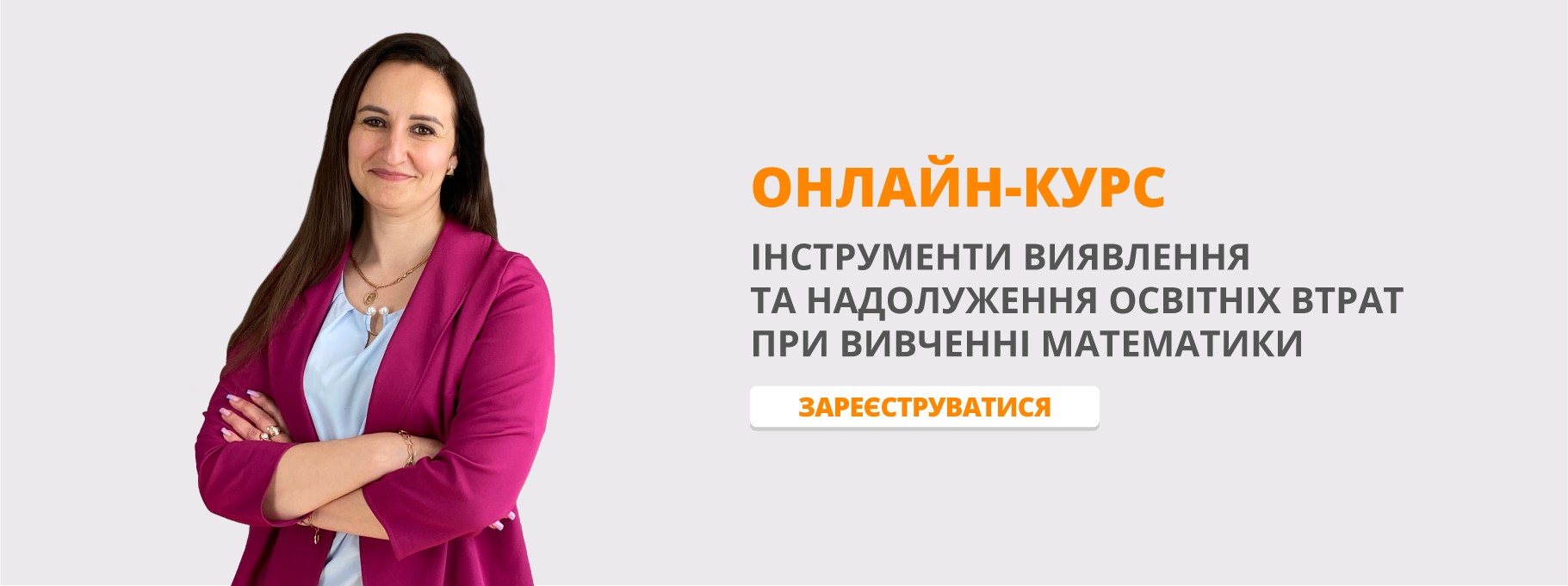Пропедевтичний курс з іноземної мови
Відділ освіти соціально - гуманітарного управління виконовчого комітету Богуславської міської ради Київської області
Шупиківської філії ОЗО Богуславський ліцей №2
ПРОПЕДЕВТИЧНИЙ КУРС З ІНОЗЕМНОЇ МОВИ
Навчальний посібник
Богуслав
2022
Пропедевтичний курс з іноземної мови [Текст]: навчальний посібник для учнів 5-6 класів. / укл. О.А. Музиченко - Богуслав, 2022. - 107 с.
Укладач: О. Музиченко, О. Музиченко, вчитель англійської мови, спеціаліст першої кваліфікаційної категорії Шупиківської філії ОЗО Богуславський ліцей №2
У посібнику розглядаються теми, зорієнтовані на підготовку учнів з різним рівнем знань, умінь і навичок до предмету «Іноземна мова» та ЗНО. Мета курсу – сприяти практичному оволодінню мовою, засвоєнню основних правил граматики та необхідного вокабуляру, розвитку навичок читання, усного мовлення, аудіювання та оволодінню навичками перекладу. Зміст посібника відповідає навчальній програмі курсу, вміщує інформаційний матеріал з тем курсу, завдання для самоконтролю учнів.
Посібник рекомендований для учнів та навчальних закладів.
CONTENT
ВСТУП ............................................................................................................................... 4
LESSON 1
TELL ABOUT YOURSELF… ........................................................................................... 5
LESSON 2
ALL ABOUT MY FAMILY AND MY FRIENDS… ...................................................... 18
LESSON 3
WHAT ARE YOU GOOD AT? ........................................................................................ 33
LESSON 4
HOBBIES AND INTERESTS........................................................................................... 45
LESSON 5
HOPES & DREAMS FOR THE FUTURE ....................................................................... 61
LESSON 6
LEARNING FOREIGN LANGUAGE ............................................................................. 72
LESSON 7
TIPS FOR LEARNING ENGLISH ................................................................................... 85
ANNEX
TEST 1.
PLURAL OF NOUNS… ................................................................................................... 94
TEST 2.
PRONOUN ........................................................................................................................ 96
TEST 3.
PRONOUN ........................................................................................................................ 99
TEST 4.
ADJECTIVE .................................................................................................................... 102
СПИСОК ВИКОРИСТАНИХ ДЖЕРЕЛ ...................................................................... 106
ВСТУП
Головна мета навчання іноземної мови полягає у формуванні комунікативної компетенції, базою для якої є комунікативні уміння, сформовані на основі мовних знань і навичок. Розвиток комунікативної компетенції залежить від соціокультурних і соціолінгвістичних знань, умінь і навичок, які забезпечують входження особистості в інший соціум і сприяють її соціалізації в новому для неї суспільстві.
Даний посібник призначений для проведення занять з англійської мови зі учнями з різним рівнем знань, умінь та навичок з предмета.
Основна мета курсу – збагатити словниковий запас (тематичний та активний), розширити межі його активації, навчити учнів спілкуватися, висловлювати і відстоювати власну думку, підтримувати розмову на пропоновані теми. Робота з матеріалом передбачає також оволодіння граматичним мінімумом, що є необхідною передумовою для повноцінного активного володіння іноземною мовою.
Основну увагу зосереджено на опануванні тематичним словником та активною лексикою. Система вправ розрахована як для очного так і для дистанційного навчання.
Курс складається із семи тем, які сприяють практичному оволодінню англійською мовою, засвоєнню основних правил граматики та необхідного вокабуляру, розвитку навичок читання, усного мовлення, аудіювання та оволодінню навичками перекладу.
В основі навчання лексики й граматики лежить принцип випереджаючого усного засвоєння мовленнєвих зразків через комунікативні завдання з подальшим аналізом та використанням цього матеріалу в мовній практиці.
Курс включає підготовку до вивчення іноземної мови, базуючись на навчальному та іншомовному досвіді, набутому в основній школі.
Посібник укладено згідно з програмних вимог навчального предмету «Іноземна мова».
LESSON 1
TELL ABOUT YOURSELF

SPEAKING
 Exercise 1. Watch the video. Read and memorize the following words and expressions.
Exercise 1. Watch the video. Read and memorize the following words and expressions.
|
1 |
Good morning! |
[gʊd ˈmɔːnɪŋ] |
Добрий ранок! |
|
2 |
Good afternoon! |
[gʊd ˈɑːftəˈnuːn] |
Добрий день! |
|
3 |
Good evening! |
[gʊd ˈiːvnɪŋ] |
Добрий вечір! |
|
4 |
Hello! |
[həˈləʊ] |
Привіт/Алло. |
|
5 |
Hi! |
[haɪ] |
Привіт. |
|
6 |
How do you do. |
[haʊ duː juː duː] |
Здраствуйте! |
|
7 |
How are you? |
[haʊ ɑː juː?] |
Як справи? |
|
8 |
I am fine. |
[aɪ æm faɪn] |
В мене все нормально. |
|
9 |
Good bye! |
[ɡʊd baɪ] |
До побачення! |
|
10 |
Good night! |
[ɡʊd nʌɪt] |
Надобраніч! |
|
11 |
See you later. |
[siː juː ˈleɪtə] |
Побачимось! |
|
12 |
See you again. |
[ˈsiː juː əˈɡɛn] |
Побачимось! |
|
13 |
Thank you. |
[θæŋk juː] |
Дякую. |
|
14 |
You are welcome. |
[ju a:ˈwɛlkəm] |
Будь ласка. |
|
15 |
Nice to meet you. |
[naɪs tuː miːt ju] |
Приємно познайомитись. |
Exercise 2. Read and dramatize the following dialogues.
1. - Hello! Nice to see you, James!
- Nice to see you too! How are you?
- Fine, thanks. Hope you are fine too.
- Sure, I am fine!
2. - Hello Johnny! How are you?
- Hi Dan! I am fine, thank you. And how are you?
- Very well, thank you. By the way, I would like to introduce you to my cousin Angy. Angy, this is my friend Johnny. Johnny, this is my cousin Angy.
- Hello there. I am Johnny.
- Hi. I am Angy.
- Nice to meet you Angy.
- Nice to meet you, too.
3. - Robert, this is my friend, Mrs. Smith.
- Hi! Nice to meet you.
- Nice to meet you too.
- Mrs. Smith, what do you do for work?
- I am a doctor.
- Oh. Where do you work?
- New York University hospital in New York City. What do you do?
- I am a teacher.
- What do you teach?
- I teach English.
- Where?
- At a high school in New Jersey.
- That is nice. How old are you?
- I am 32.
4. - Good morning!
- How are you Mike?
- I am fine Linda.
- We are in the same class.
- That is right! Can I have your telephone number?
- Sure, it is 86021456.
5. - Hello! My name is Mike.
- I am Linda. How are you Mike?
- I am fine, how about you?
- I am fine too but I am a little lost.
- What is your first class?
- I have Spanish classes.
- Nice, we are classmates.
- That is great!
6. - Good morning! You must be Otto.
- Yes, good morning! I am sorry, and your name is…?
- My name is Karen. Very nice to meet you. Welcome to Ohio!
- Thank you.
- How are you today?
- Very well, thank you, and you?
- I’m good, thanks for asking.
Exercise 3. Use words from the box.
|
I’m |
thanks |
you |
my |
are |
I’m |
This |
|
Japan |
nice |
name’s |
you |
from |
you |
Fine |
1.
Hello. My Kioko Suzuki. I’m from ![]() . to meet
. to meet ![]() , Kioko.
, Kioko. ![]() Mario Rosetti Italy. And is friend John from London.
Mario Rosetti Italy. And is friend John from London.
2.
Hi, Sue. How ![]() ?
?
, thanks. And ?
Fine, .
GRAMMAR
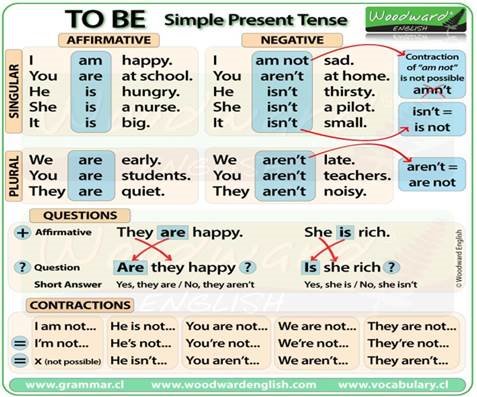
Exercise 4. Use the verbs am, is, are, make negative and interrogative sentences.
EXAMPLE: + They are friends.
- They are not friends.
? Are they friends?
1. She … a teacher.
2. They … in Berlin.
3. It … a nice day.
4. I … excited.
5. We … students.
6. You … right.
7. It … 6 o’clock.
8. The table … blue.
9. He … a new manager.
10. They … sorry.
Exercise 5. Choose the correct Present Simple forms of “to be” to for the gaps below.
1. … you a teacher? Yes, I … .
2. … your name Marcus? Yes, it … .
3. … your children here? No, they … .
4. … this your suitcase? No, it … .
5. Where … we? I think this … Oxford street.
6. … it Saturday today? No, it … Sunday.
7. … your friends from the UK? No, they … from the US.
8. Hello, Maria. How … you? I … fine, thanks.
9. How old … Peter? I think he … 30 years old.
10. … David and Molly here? Yes, they … next to the door.
Exercise 6. Rewrite the sentences using the short forms of be.
EXAMPLE: They are good friends. ⇒ They’re good friends.
1. She is fantastic.
2. We are in Spain.
3. You are not my friend.
4. Sheila is from Brighton.
5. The chairs are not expensive.
6. I am not British.
7. Clara is a good student.
8. You are great.
9. They are my friends.
10. He is not angry.
Exercise 7. Fill in the gaps with the correct Present Simple forms of “to be”.
Sofie: Hello. … you from here?
Dino: No, we … . And you? … you from here?
Sofie: No, I … from France. My name … Sofie.
Dino: Nice to meet you. I … Dino. And this … Francesca.
Sofie: Where … you from?
Dino: We… from Italy.
Sofie: … you from Rome?
Dino: No, we… . We … from the north of Italy. I … from Torino, and Francesca … from Milano.
Sofie: … you here on holiday?
Dino: No, we … . It … a study trip. This … a beautiful place.
Sofie: Yes, it … . … the trip nice? Dino: Very nice.
SPEAKING
Exercise 8. Complete the sentences.
1. Hi! My name is …
2. I’m from … (country).
3. I live in … (city).
4. I’m …. years old.
5. My birthday is on … .
6. I’m a student at … .
7. My favourite subject is … .
8. My favourite sport is … .
9. There are … people in my family.
10. They are … .
11. My father is a … and my mother is a …
12. I would like to be a … because … .
13. My hobby is … .
14. In my free time I also like … .
15. I don’t like … .
16. My favourite day of the week is … .
17. My favourite month of the year is … .
LISTENING
Nice to meet you! How to Introduce People in English
 Exercise 9. Watch the video and choose the correct answer.
Exercise 9. Watch the video and choose the correct answer.
1. Who invited the family to a barbecue?
a) a neighbor;
b) a colleague;
c) a friend.
2. Why is Julia nervous?
a) she meets the class;
b) she comes from the UK;
c) she seats by the window.
3. Who is Michelle?
a) American;
b) British
c) Chinese.
4. Mei is from … .
a) the USA;
b) Germany;
c) Asia.
5. Who is in the swimming team?
a) Brian;
b) Mei;
c) Julia.
6. Alex and his wife Emma and their children are … .
a) new neighbors;
b) new friends;
c) new relatives.
7. Where are they from?
a) the USA;
b) Ukraine;
c) the UK.
GRAMMAR
|
|
Pronoun is a word that can replace a noun in a sentence. |
|||
|
Subject Pronoun |
|
|
Object Pronoun |
|
|
I |
|
я |
me |
мене, мені |
|
You |
|
ти, ви |
you |
тебе, тобі |
|
He |
|
він |
him |
його, йому |
|
She |
|
вона |
her |
її, їй |
|
It |
|
він, вона, воно |
it |
його, йому її, їй |
|
We |
|
ми |
us |
нас, нам |
|
They |
|
вони |
them |
їх, їм |
Exercise 10. Choose the correct Subject Pronouns or Object Pronouns to complete the following sentences.
1. What time can I call he/him?
2. He/him never listens to us/we.
3. Do you like my new glasses? Yes, I/me love they/them/it.
4. Tom loves his rabbits. He/him plays with they/hem in the garden every day.
5. Please, call I/me soon. I/me am very worried.
6. Look, Sara and Kevin. Can you see they/you/them?
7. Tell John that him/she/he can meet they/us/we at the canteen.
8. I like your earrings. Can I/me see they/them?
9. Look at that man. Who is he/him?
10. That man over there is David. I work with her/he/him.
Exercise 11. Complete the sentences using the correct Subject Pronouns or Object Pronouns.
1. I'm not dangerous. Don't be afraid of … .
2. I don't like this music. … is boring. Can you stop?
3. That's my money. Can you give … to ….? I need it.
4. Susan is in trouble and … needs help. We have to help … .
5. Jack is very special. I think I'm in love with … .
6. We are going to the cinema. Do you want to come with …?
7. I don't want to eat this cheese. … smells horrible.
8. Don't eat cookies. … are very unhealthy.
9. I can't find Sally. Where is …?
10. … need help. Can you help us?
READING
Exercise 12. Read the text. Answer the questions.
Hello, our names are Paola, Janos and Pablo. We are very good friends. We are in the mountains now because we like walking and climbing.
My name is Paola and I am Italian. I am a teacher and I have a family in Rome. I like all sports, especially climbing and cycling.
Pablo is Portuguese. He is a translator. His favourite music is rock and pop. He likes skiing.
Janos is Hungarian. He is our leader. He is an engineer and he likes travelling. He is a good runner.
1. Who is the leader of the group?
2. What nationalities are they?
3. Where is Paola family?
4. Who likes travelling?
5. Why are they in the mountains now?
6. Who is interested in all sport?
7. Who is from Hungary?
Exercise 13. Read the information and say about yourself.
Start your speaking with “I would like to introduce myself…”
|
|
|
|
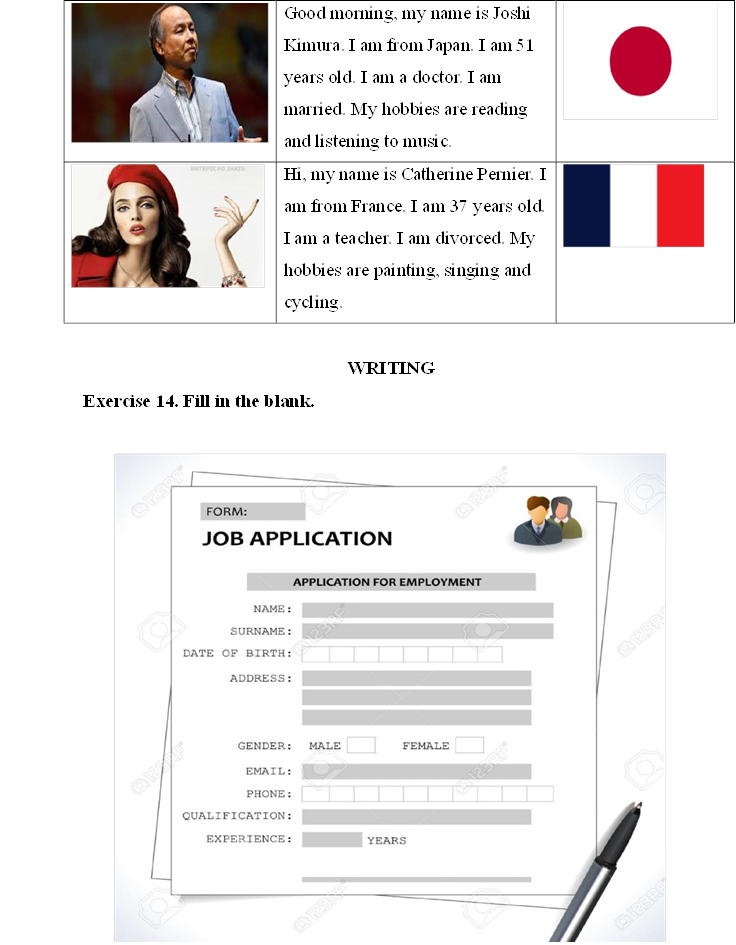
Exercise 15. Test.
1. Betty ..... at home.
a) am
b) is
c) are
2. Mark and Ann ...... students.
a) is
b) are
c) am
3. I ...... 20 years old.
a) am
b) are
c) is
4. It ..... a notebook.
a) am
b) is
c) are
5. We ..... interested in music.
a) is
b) are
c) am
6. The weather ..... wonderful today.
a) am
b) is
c) are
7. The books ..... on the desk.
a) is
b) am
c) are
8. Where ..... you from?
a) am
b) is
c) are
9. What ..... your phone number?
a) are
b) am
c) is
10. Nick ..... busy now.
a) is
b) am
c) are
Exercise 16. Complete the sentences.
1. What … your name? - My name … Ann.
2. How old … you? – I … 25.
3. Where … you from? – I … from New York.
4. … he a doctor? - No, he … . He … a manager.
5. What … the weather forecast for tomorrow?
6. He … not well today.
Exercise 17. Fill in the blank.
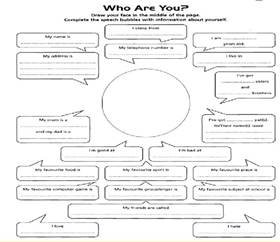
LESSON 2
ALL ABOUT MY FAMILY & MY FRIENDS

Exercise 1. Read and memorize the following words and expressions.
|
1 |
True\ real friend |
[tru frɛnd] |
справжній друг |
|
2 |
Loyal friend |
[ˈlɔɪəl frɛnd] |
вірний друг |
|
3 |
Fast friends |
[fæst frɛndz] |
близькі друзі |
|
4 |
School friends |
[skul frɛndz] |
шкільні друзі |
|
5 |
Childhood friends |
[ˈʧaɪldˌhʊd frɛndz] |
друзі дитинства |
|
6 |
Old friends |
[oʊld frɛndz] |
старі друзі |
|
7 |
Boyfriend\girlfriend |
[bɔɪ-frɛnd / gɜrl-frɛnd] |
Хлопець / дівчина (в стосунках) |
|
8 |
This is my friend… |
[ðɪs ɪz maɪ frɛnd…] |
Це мій друг / подруга… |
|
9 |
Meet my friend… |
[mit maɪ frɛnd…] |
Познайомся з моїм другом / подругою… |
|
10 |
Let me introduce my friend… |
[lɛt mi ˌɪntrəˈdus maɪ frɛnd…] |
Дозвольте представити мого друга / подругу… |
|
11 |
Get acquainted with my friend… |
[gɛt əˈkweɪntɪd wɪð maɪ frɛnd…] |
Познайомтеся з моїм другом / подругою… |
|
12 |
To make friends |
[tu meɪk frɛndz] |
Потоваришувати |
|
13 |
Friendship |
[ˈfrendʃɪp] |
Дружба |
|
14 |
To be friends |
[tə bi frendz] |
Бути друзями |
|
15 |
A friend in need is a friend indeed |
[ə frɛnd ɪn nid ɪz ə frɛnd ɪnˈdid] |
Друг пізнається в біді. |
Exercise 2. Read and dramatize the following dialogues.
1.
- Hello, Anna. I want to invite you to my party. I will not accept your refusal.
- Oh, Tim. I am not going to scold with you but I cannot visit it. Sorry.
- Why? I think we are good friends.
- Yes, I am not an enemy to you. But I am really very busy this week.
- Ok, Anna. I will not object you if you do not come to me this time. However, I will be upset if you do not visit my party next time. Buy.
- Buy.
2.
- Hi, Peter. Do you want to go to the cinema after school?
- Hi, Sasha. It is a good idea. But I will be so hungry so maybe at first go to pub?
- Ok. I will eat smth too. See you later.
- See you later.
3.
- Do you have a best friend, Ben?
- Sure. It’s Tony. He is my best mate. We started school together.
- Do you trust him?
- 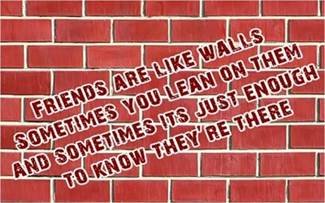 Yes. I trust him absolutely and I know he will never betray me. - You are lucky to have such a friend. You should cherish your friendship.
Yes. I trust him absolutely and I know he will never betray me. - You are lucky to have such a friend. You should cherish your friendship.
- Well. I will support him in any situation too.
- Have you ever quarreled with each other?
- Yes, we have. Sometimes we quarrel about some silly things but I’m sure we don’t mean to hurt each other. Besides, Tony is very calm and he usually tries to avoid conflicts.
- Ben, you are so much success with girls. Doesn’t your friend envy you?
- Oh, I didn’t even think about it. I think it’s nonsense.
- OK. And how about your secrets? Can you share them with Tony?
- Certainly. Tony knows all my secrets because he is my real friend. And I’m glad we have so much in common.
GRAMMAR
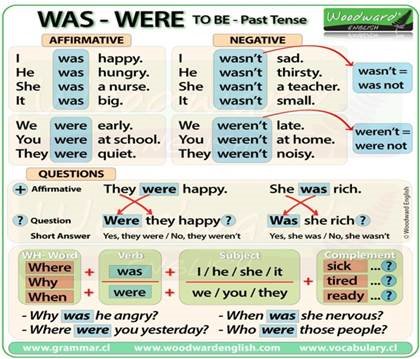 Exercise 3. Complete the following sentences with was/were or wasn’t/weren’t.
Exercise 3. Complete the following sentences with was/were or wasn’t/weren’t.
1. Where … you last night? I called you, but you … at home.
2. … Sandra happy after the exam? No, she … .
3. I remember I … very worried, but you … calm.
4. Betty and Paul … at home; they … at the cinema.
5. … you tired after the concert? Yes, I … .
6. I'm very sorry. You … right, and I … wrong.
7. Were your parents at the meeting? My dad … there, but my mum … .
8. We … late! We … early. The concert was at 8 and we arrived at 7.
9. Vivian … at the meeting, but I … there. I always go to the meetings.
10. … Tim with you? No, only Sally and Peter … there with me.
Exercise 4. Write questions using was/were and the words below. Put the words in the correct order.
EXAMPLE: you / what time / at the station ⇒ What time were you at the station?
1. the keys / where ⇒
2. Robin / why / at the meeting ⇒
3. born / she / when ⇒
4. how expensive / the hotel ⇒
5. why / you / angry ⇒
6. unconscious / I / after the accident ⇒
7. the questions / difficult ⇒
8. the accident / what time ⇒
9. you / how often / in contact with them ⇒
10.where / you and Tom / last night ⇒
Exercise 5. Choose was/were or am/is/are to complete the following sentences.
1. My son … short in school, but now he … tall.
2. … you at the stadium yesterday? Yes, I … .
3. Yesterday Philip and Emma … in London. Today they … in Paris.
4. Sara and I … at home that night, and you … with us.
5. Yesterday we … late for the concert, and today I … late for class.
6. Asim … born in Egypt, and I … born in Birmingham.
7. … you excited about the trip? Yes, we … very excited.
8. … Kate angry yesterday after the meeting? No, but I think she … angry now.
9. … you at the beach last Sunday? Yes, I … .
10. The weather … nice today, but it … horrible last weekend
LISTENING
 Exercise 6. Listen to Nicolas talking about his friends. For questions 1 to 10, choose True or False.
Exercise 6. Listen to Nicolas talking about his friends. For questions 1 to 10, choose True or False.
|
|
|
T |
F |
|
1 |
Nicolas met Kevin at primary school. |
|
|
|
2 |
Nicolas and Kevin often went swimming together. |
|
|
|
3 |
Nicolas and Kevin were both good at their schoolwork at primary school. |
|
|
|
4 |
Neither Nicolas nor Kevin enjoyed playing sports. |
|
|
|
5 |
Kevin enjoyed going to the gym at secondary school, but Nicolas didn’t. |
|
|
|
6 |
Nicolas doesn’t see Kevin very often these days. |
|
|
|
7 |
Charlie and Nicolas have similar personalities. |
|
|
|
8 |
Charlie liked Nicolas because he was similar to his parents. |
|
|
|
9 |
Charlie and Nicolas both finished relationships at about the same time. |
|
|
|
10 |
Charlie and Nicolas play computer games and racquetball together. |
|
|
SPEAKING
Exercise 7. Answer the questions to find out if you are a good friend.
|
find out — дізнатись let — дозволяти has forgetten — забув\забула be absent from collage — бути відсутнім |
1. How many friends do you have?
2. Do you let your friend copy your homework if he (she) hasn’t done it?
3. Do you always buy a present for your friend if he (she) has a birthday?
4. Do you share your lunch with your friend if he (she) has forgotten it?
5. Do you call your friend if he (she) is absent from collage?
6. Will you help your friend if he (she) gets a bad mark in some subject?
7. Will you talk to your friend if he (she) calls you when you are watching your favourite TV programme?
Exercise 8. Tell us about your friend. Remember to say:
- what he / she looks like;
- what kind of person he or she is; -when and how you made friends;
- what friends are for.
GRAMMAR
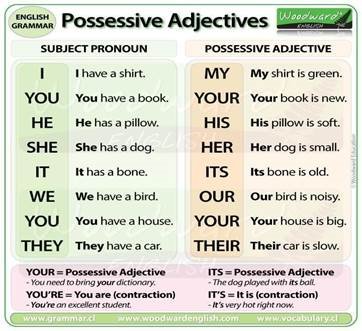 Exercise 9. Choose the correct Subject or Possessive Pronouns to complete the sentences.
Exercise 9. Choose the correct Subject or Possessive Pronouns to complete the sentences.
1. Harry is … friend. … has a nice house.
2. … are very happy with … new dog.
3. We love… little dog.
4. … wants … breakfast.
5. We want to see … children.
6. Scotland is famous for … rainy
weather.
7. Susan lives on… street. … house is very near.
8. What are those? … are postcards.
9. I like this place and … special atmosphere.
10. I love this place. … is very special.
Exercise 10. Choose the correct Subject Pronouns or Possessive Adjectives to complete the following sentences.
1. Go to office.
a) you
b) your
c) yours
2. six o'clock. Let's go home.
a) It's
b) Its
c) His
3. Our products are famous for durability.
a) their
b) its
c) they
4. I'm very happy about marks.
a) you
b) your
c) yours
5. Valeria is from Italy, but ![]() 's in Ireland now.
's in Ireland now.
a) his
b) her
c) she
6. These are my friends. from Finland.
a) Their
b) They're
c) They
7. The apartment has own private garden. a) it's
b) its
c) his
8. Are umbrellas here?
a) we
b) ours
c) our
9. Mark and Linda are in caravan.
a) they
b) their
c) its
10. I need tools, please.
a) your
b) you
c) yours
Exercise 11. Fill in the gaps with the correct Possessive Adjectives: my, your, his, her, its, our, their.
1. Sally is in … room.
2. Paul and Benet always help … friends.
3. We live with … parents.
4. Is that … hat?
5. The police officers don't have … guns.
6. The best part of this car is … price.
7. Amanda lives with … boyfriend.
8. I don't like … new job.
9. These shoes are famous for … comfort.
10. Thomas is in … office.
Exercise 12. Complete the following sentences with the correct Possessive Pronoun.
1. The gloves belong to Mary. They are .
2. Their meals have arrived but we are waiting for .
3. Those aren’t my keys. are in my pocket.
4. This book is ![]() . It has your name on it.
. It has your name on it.
5. The house belongs to Jack and Jill. It is .
6. Ange and I have a new car. It is .
7. Is this Phillip’s pen? No, it’s not ![]() .
.
8. It isn’t my phone because is at home.
READING
Exercise 13. Read the text and for questions 1 to 9 choose the correct answer.
Dear Marta,
I’m going to tell you about my family. I live with my little sister, mum, and dad. We live in London, although I grew up in Lancaster, a beautiful city in the North of England.
My dad’s name is Pierre. He’s from France, and he speaks English and French. When he was young, my mother went to France on a student exchange, and they met there. A few years later, my dad moved to England and married my mum. He works as a
French teacher. He’s very tall –much taller than my mum– and athletic. He’s got short blonde hair and blue eyes.
My mum’s name is Anna. She’s English. She’s quite short, and she’s got long curly brown hair and brown eyes. She works at a chemist’s opposite our home. She can speak French too!
My sister Julia is 18 years old, and she’s got the same color of hair and eyes as my father. She loves playing the piano and dancing. She’s very talented, and she would like to be a professional musician.
I’ve got short blonde hair like my dad, but brown eyes like my mom. We all love playing board games together on Friday evenings, and we always order pizza. Our favourite game is Monopoly. Oh, I almost forgot…we’ve also got a pet cat, Snowball.
It’s all white and has got a lot of fur. It likes sleeping on me.
Write back soon. Please, tell me about your family too.
Love, Jonathan.
|
|
|
T |
F |
|
1 |
Jonathan was born in London. |
|
|
|
2 |
His parents both speak more than one language. |
|
|
|
3 |
They got married in France. |
|
|
|
4 |
Jonathan's mother is a lot shorter than his father. |
|
|
|
5 |
She doesn't work far from home. |
|
|
|
6 |
Jonathan's sister's got blue eyes. |
|
|
|
7 |
She works as a musician. |
|
|
|
8 |
Jonathan's hair is the same colour as his mother's. |
|
|
|
9 |
On Fridays, they always eat the same thing. |
|
|
WRITING
Exercise 14. Complete the text below with the words in the box.
|
a |
dad’s |
going |
His |
in |
loves |
reading |
’s got |
taller |
than |
twice |
Dear Marta,
I'm 1) going to tell you about my family. I live with my brother, my mum, and my dad. We live 2) ![]() Lincoln, a nice city in the East Midlands region of England.
Lincoln, a nice city in the East Midlands region of England.
My 3) name is Albert. He's 51 years old, and he's 4) History teacher. He's medium height, and he 5) short grey hair and green eyes. He loves 6) books and watching documentaries about prehistoric times. He doesn't like sports.
My mum's name is Melissa. She's 49 years old. She's a little shorter 7) my dad, and she's got long brown hair and blue eyes. She is a shop owner. She sells
beauty products in a shop near our home. She 8) swimming. She goes swimming 9) a week.
I've got a twin brother. 10) name's Luke. He's 21 years old, and he's got brown hair, like me. But he is much 11) ![]() than me. He is very big and strong, and he loves playing rugby and going to the gym.
than me. He is very big and strong, and he loves playing rugby and going to the gym.
Another very important member of our family is Cooper, our dog. It is ten years old, and we love it!
What about your family?
Love,
Sam.
Exercise 15. Writing about my family.
1. Plan your paragraphs
 Before writing an essay, you should plan how to organize your ideas. For example, if you want to write about your family, you could use a paragraph for each member of your family. Then, you could think about the things that you want to say about each person. It’s a good idea to draw a diagram before writing your text.
Before writing an essay, you should plan how to organize your ideas. For example, if you want to write about your family, you could use a paragraph for each member of your family. Then, you could think about the things that you want to say about each person. It’s a good idea to draw a diagram before writing your text.
2. Check the word order
When you are writing, check the word order in each sentence. Don’t forget to start your sentences with a subject + a verb, and then add other details that you want to include. The elements of an English sentence usually appear in this order:
subject + verb + object + how + where + when.
3. Plan your grammar
 Your text should be rich in grammar and vocabulary. Make sure that you use different grammar items. After you write a sentence, you can try to say the same thing in different words. For example, imagine you write this: “I have a brother. His name is Albert. He is a mechanic.” These sentences are OK. But you can change them and say this: “My brother’s name is Albert. He is a mechanic.”
Your text should be rich in grammar and vocabulary. Make sure that you use different grammar items. After you write a sentence, you can try to say the same thing in different words. For example, imagine you write this: “I have a brother. His name is Albert. He is a mechanic.” These sentences are OK. But you can change them and say this: “My brother’s name is Albert. He is a mechanic.”
4. Check your grammar
When you write your text, make sure that your grammar is OK. Read each sentence two or three times and correct the mistakes. If you are not sure of a word or expression, don’t use it — or check how to write it correctly first.
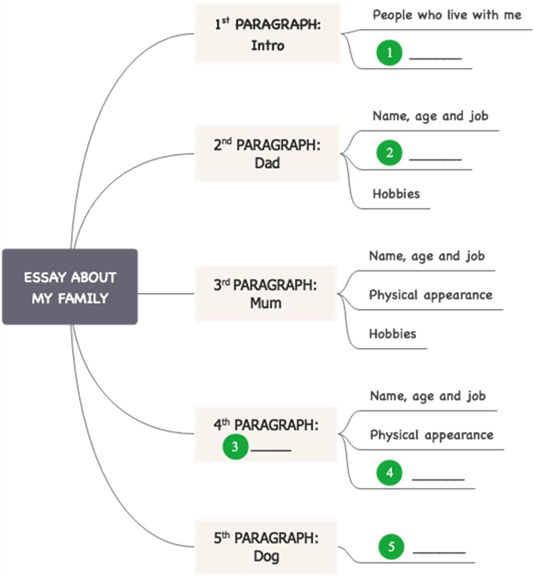
Answer the questions here:
1. Gap 1:
a) Hobbies
b) Job
c) Place where we live
d) Name and age
e) Physical appearance
f) Brother
g) Dad 2. Gap 2:
a) Hobbies
b) Job
c) Place where we live
d) Name and age
e) Physical appearance
f) Brother
g) Dad 3. Gap 3:
a) Hobbies
b) Job
c) Place where we live
d) Name and age
e) Physical appearance
f) Brother
g) Dad 4. Gap 4:
a) Hobbies
b) Job
c) Place where we live
d) Name and age
e) Physical appearance
f) Brother
g) Dad
5. Gap 5:
a) Hobbies
b) Job
c) Place where we live
d) Name and age
e) Physical appearance
f) Brother
g) Dad
Exercise 16. Choose the correct options to complete these sentences.
1. I tell you about my family.
a) 'm going to
b) going to
c) 'm going
2. is Albert.
a) My father name
b) My father's name
c) The name of my father's
3. We live Lincoln.
a) on
b) at
c) in
4. He's teacher.
a) –
b) a
c) an
5. He short grey hair and green eyes.
![]()
a) got
b) have
c) 's got
6. He loves books.
![]()
a) reading
b) read
c) to reading
7. She's shorter ![]() my dad.
my dad.
a) that
b) as
c) than
8. He sports.
a) doesn't likes
b) not likes
c) doesn't like
9. She goes swimming twice week.
a) in a
b) on a
c) a
10. He's than me.
a) more tall
b) taller
c) more taller
SPEAKING
Exercise 17. Watch the video and say about your family.

LESSON 3
WHAT ARE YOU GOOD AT?
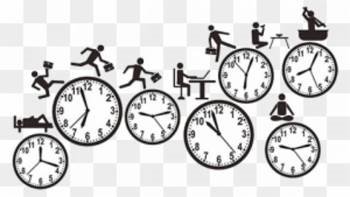
 Exercise 1. Watch the video. Write down and memorize the following words and expressions.
Exercise 1. Watch the video. Write down and memorize the following words and expressions.
 Exercise 2. Repeat days of the week and months of the year.
Exercise 2. Repeat days of the week and months of the year.
![]() Exercise 3. Read and dramatize the following dialogues.
Exercise 3. Read and dramatize the following dialogues.
1.
- Hi, let me tell you about my daily routine. First, I get up at 8.00, then I brush my teeth, have a shower, and eat breakfast. I go to work at 8.50, and I start work at 9.30. Then I have lunch at 1.00, and finish work at 5.30. I go to bed at 11.00. That's my day!
2.
- Hi! My name is Sylvia. I come from Korea. I'm 24 years old, I'm tall and I have black hair. I like music and movies. I also like reading books. I play sports and I study English. I'm really happy to meet you!
3.
- Tyler, do you have a hobby?
- Sure, I read books.
- Oh, I like books as well. Do you watch TV?
- Yes, I watch TV every day. I like drama and comedy programs.
- I like the news. And I go to the gym as well.
- Me too! Let's go together.
- That sounds great!
Exercise 4. Read the text about the daily routines of a sportswoman and for questions 1 to 7 choose the correct answer.
The daily routines of a sportswoman
Janet is an athlete, and she wakes up at 4:30 a.m. every weekday morning. She spends the first 30 minutes reading and then 15 minutes meditating. At 5:15 a.m. Janet checks her email for only 30 minutes and then goes for her first run of the day. She runs for an hour and a half along the lake near her house. After running, Janet has a shower and then prepares breakfast, which is usually cereal and fruit. However, she occasionally has a less healthy breakfast.
She usually finishes breakfast at around 8 a.m. If it is a weekday, she always leaves the house at 8:20 and goes to training. Her training starts at 9 a.m., and she needs 30 minutes to drive to the gym. She trains for 3 hours with her team and then goes home for lunch. She always eats a very big and healthy lunch. As soon as she finishes lunch, she has a nap for one hour.
After her nap, she likes to go for a walk around the lake and look at nature. She sometimes reads or meditates at the lake in the afternoon. In the evening, during the week, she meets up with friends. Most of her friends are athletes too, so they have a lot to talk about.
She typically goes to bed at 9 p.m. because she prefers to be awake in the morning than at night. She sometimes falls asleep listening to music, but she never watches the television or reads anything on her tablet. She always makes sure her alarm is set and is almost always asleep by 9:45 p.m.
1. What time does she finish checking her emails?
a) 5:30 a.m.
b) 5:45 a.m.
c) 6:00 a.m.
2. How long does she run for in the morning?
a) 45 minutes
b) 60 minutes
c) 90 minutes
3. Janet has a healthy breakfast.
a) always
b) occasionally
c) usually
4. How often does she meditate?
a) once or twice a day
b) once a day
c) rarely
5. What does Janet do to help her get to sleep?
a) listens to music
b) reads on her tablet
c) watches TV
6. What is the last thing she does before going to sleep?
a) she reads
b) she sets her alarm
c) she checks the time.
GRAMMAR
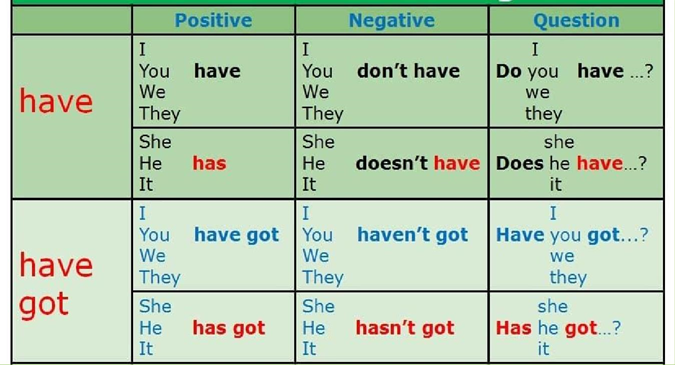
Exercise 5. Choose the correct verb forms to complete the sentences below.
1. a pen?
a) Do you have got
b) Have you got
c) You have got
2. They any children.
a) don't have got
b) don't got
c) haven't got
3. Have you got a car? Yes, I .
a) Have
b) Do
c) 've got
4. When we were kids, we many toys.
a) hadn't got
b) didn't have
c) hadn't
5. He a very nice family.
a) 's got
b) have got
c) 've got
6. There is a door here. the key?
a) Have you got
b) Do you got
c) Do you have got
7. They two cats and two dogs.
a) has got
b) 've
c) 've got
8. a question?
a) Have you
b) Do you have got
c) Do you have
9. I the answer to your question.
a) haven't
b) don't have got
c) haven't got
10. I a lot of money at the moment.
a) don't have got
b) don't have
c) haven't
Exercise 6. Thransform these sentences using the verb have got like in the example below. Use short forms when possible: ‘ve got, ‘s got, haven’t got, hasn’t got.
EXAMPLE: They have a yacht ⇒ They ‘ve got a yacht.
1. I have a new computer. ⇒
2. Do you have a new profile photo? ⇒
3. She has blonde hair and blue eyes. ⇒
4. I don't have a Twitter account. ⇒
5. She doesn't have any money. ⇒
6. Do you have a laptop? Yes, I do. ⇒
7. They have a lot of Youtube fans. ⇒
8. He doesn't have any interest in science. ⇒
9. Does she have a sister? ⇒
10. I have a terrible headache. ⇒
Exercise 7. Change the following sentences or questons into the Past Tense.
EXAMPLE: They haven’t got a house ⇒ They didn’t have a house.
1. He's got a girlfriend. ⇒
2. They haven't got any problems. ⇒
3. Have you got a pen? ⇒
4. She hasn't got a sister. ⇒
5. He's got an exam. ⇒
6. Has she got a cold? ⇒
7. Have you got a headache? ⇒
8. I haven't got time. ⇒
9. She's got a nice smile. ⇒
10. He hasn't got much experience. ⇒
LISTENING
Exercise 8. Listen to a student talk about his daily routines. For questions 1 to 7, choose the correct answer.
![]()
1. What time does he wake up?
a) at 7.30
b) at 8.00
c) at 7.00
2. Which of these things does NOT he have for breakfast? a) fruit
b) toast and jam
c) juice
3. How does he go to school?
a) he goes by bus
b) he goes by car
c) he walks
4. What time does he have a break for lunch?
a) at 11.00
b) at 12.00
c) at 12.40
5. Where does he have lunch?
a) in the town centre
b) at the school
c) at home
6. What does he think about school food?
a) it isn't good
b) it's good
c) it's very good
7. What does he do when he arrives home?
a) he relaxes
b) he helps his mum
c) he has dinner
SPEAKING
![]() Exercise 9. Write the specified time in numbers.
Exercise 9. Write the specified time in numbers.
EXAMPLE: it’s twenty past five. – 5:20
1. It’s half past three.
2. It’s ten to six.
3. It’s a quarter past two.
4. It’s a quarter to twelve.
5. It’s twenty to one.
6. It’s half past eight.
7. It’s five past eleven.
8. It’s twenty-five to four.
9. It’s nine o’clock.
10. It’s ten past ten.
Exercise 10. Write the specified time in words.
4:45 12:40 6:30 3:00 5:10 2:35 9:55 12:05 8:25 7:15
Exercise 11. Choose the correct variant.
1. It’s twenty past eight.
a) 7:40
b) 8:20
c) 8:40
2. It’s half past seven.
a) 6:30
b) 7:30
c) 8:30
3. It’s a quarter past five.
a) 4:45
b) 5:15
c) 6:15
4. It’s a quarter to ten.
a) 10:15
b) 10:45
c) 9:45
5. It’s ten to twelve.
a) 12:10
b) 12:50
c) 11:50
Exercise 12. Arrange the following sentences in chronological order.
1. It’s twenty to one.
2. It’s twenty past twelve.
3. It’s five to one.
4. It’s a quarter to one.
5. It’s half past twelve.
6. It’s a quarter to twelve.
7. It’s a quarter past twelve.
8. It’s noon.
9. It’s five past twelve.
10. It’s five to twelve.
CONTROL TASKS
|
Task 1. Use am, is, are.
|
|
|
|
||
|
A: Hi, Alex. How (1) |
you? |
|
|
||
|
B: Hello David. I (2) |
fine and how (3) |
you doing? |
|
||
|
|
A: I (4) |
doing fine. |
|
||
|
|
B: How (5) |
your sister? Where (6) |
she now? |
||
|
|
A: She (7) |
in London. She (8) |
learning English there. |
||
B: Really? That (9) ![]() wonderful! How about your parents?
wonderful! How about your parents?
A: They (10) fine too. They (11) in Cyprus now.
B: (12) you busy tonight?
A: Not really, why?
B: We (13) having a party. Would you like to come?
A: I’d love to.
B: Then come to our place at 7:00 p.m.
Task 2. Write in was / were.
The third day ![]() Wednesday. The boys in the swimming-pool. Steve the fastest swimmer! On Thursday we at the circus! The bears funny! The fifth day Friday. In the morning we
Wednesday. The boys in the swimming-pool. Steve the fastest swimmer! On Thursday we at the circus! The bears funny! The fifth day Friday. In the morning we ![]() in the zoo.
in the zoo.
Task 3. Read the text. For questions 1 to 8, choose True or False.
Greg’s Daily Routine
Greg is an American boy. He lives in Arlington, Texas. He lives with his family in a modern house. He is eleven years old and he has got an older brother, Alex, and a younger sister, Emma.
He starts his day at about half past six. He gets up, goes to the bathroom, takes a shower, brushes his teeth and gets dressed. Then he has breakfast and at a quarter to seven he leaves home and catches the bus to school.
Classes begin at half past seven. He usually has lunch at the school canteen at half past twelve. After school, at a quarter past five, he goes home. There he does his school homework and when he finishes it he helps his Mum laying the table. At half past seven the family dines together.
Greg is a very helpful boy, so he helps his mother cleaning up everything after dinner.
He usually watches TV for a while after dinner and at about ten o’clock he brushes his teeth again, puts on his Spider Man pajamas and goes to bed. His parents always kiss him good night before he gets asleep. Greg is a very happy boy!
|
|
|
T |
F |
|
1 |
Greg is an American boy. |
|
|
|
2 |
Greg lives in a modern flat. |
|
|
|
3 |
Greg is eleven years old. |
|
|
|
4 |
Greg has got two brothers. |
|
|
|
5 |
Greg wakes up at eight o’clock. |
|
|
|
6 |
Greg walks to school. |
|
|
|
7 |
Greg classes begin at half past eight. |
|
|
|
8 |
Greg and his family have dinner at half past seven. |
|
|
Task 4. Answer the following questions.
1. What time do you get up?
2. Where do you have breakfast?
3. What do you have for breakfast?
4. Do you go to college in the morning or in the afternoon?
5. What time do you have lunch?
6. What do you do in the afternoon?
7. When do you do your homework?
8. Do you have a shower before going to bed?
9. Do you watch TV at night?
10. What is your favorite TV programme?
11. What time do you go to bed?
LESSON 4 HOBBIES AND INTERESTS
![]() I like / I love / I really like
I like / I love / I really like
Коли ми говоримо про захоплення
(і речі в цілому), використовуючи
“I like”, ми маємо увазі, що нам щось подобається, ми чимось
захоплюємося, щось полюбляємо.
А щоб підсилити значимість цього заняття в нашому житті, використовуємо такі
конструкції, як “I love” та “I
really like / am really fond of / am really into”. У цьому випадку мається на увазі, що ми щось
обожнюємо, дуже сильно любимо, тощо.
Like to do / Like doing something
Важливе доповнення! Використовуючи “Like” + герундій, британці зазвичай мають на увазі інтерес до якогось хобі в цілому. А про любов до конкретних захоплень повідомляють за допомогою конструкції “Like” + “to” + інфінітив.
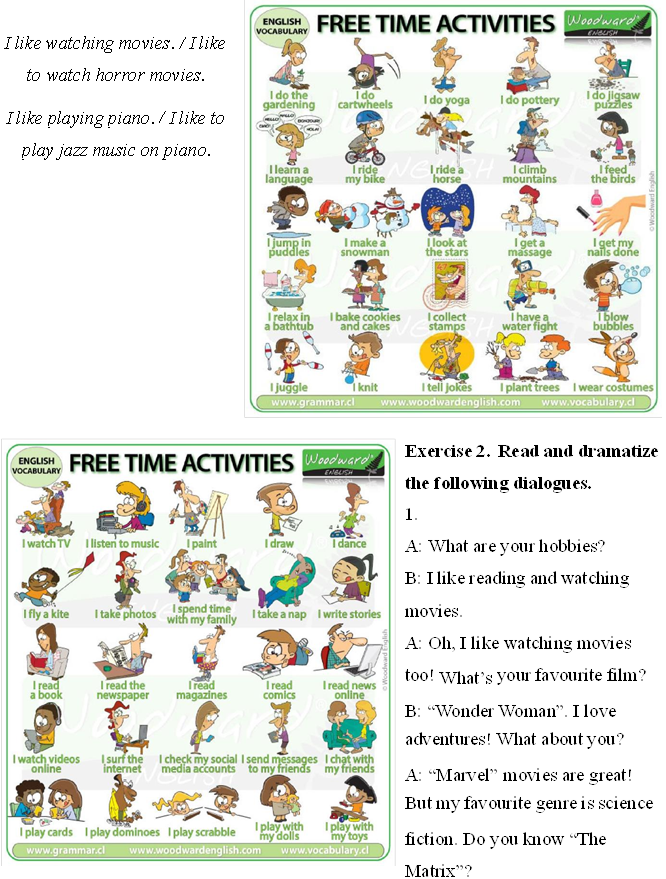
B: Hmm. No, I don’t.
A: It’s fantastic! Do you want to see it?
B: Hmm. Yes, I do.
A: Let’s go to the cinema together!
B: Good idea!
2.
A: Do you have any hobby?
B: Sure, I have. I like to sing and to dance.
A: How often do you sing and dance?
B: Three times a week. And do you have any hobby?
A: Of course, I have! I have two hobbies. I like to draw pictures and to photo animals.
B: Wow, it sounds cool! How often do you do this?
A: I photo animals in the park twice a week! I draw pictures every day.
B: You have great hobbies!
A: You too!
3.
A: Hello, Anny.
В: Hi.
A: What do you like doing in your free time? What are your hobbies?
B: I like listening to music and I like to sing, too. How about you?
A: I like to listen to music, too.
B: What kind of music do you like?
A: I like rock music. And you?
B: Rock music is not my thing. I like pop music. What else do you like doing?
A: I really like painting. I often paint landscapes.
B: Great. I can't paint at all.
A: It isn't as difficult as you think. I can teach you if you want.
B: Brilliant! Of course, I want. When can we begin?
4.
A: What hobbies are popular in your family?
B: We have a lot of hobbies. My father is fond of fishing, gardening, playing and watching football.
A: What about your mother?
B: She loves reading, swimming and listening to classical music. And she also relaxes when she watches soap-operas.
A: And how do you spend your free time?
B: I like playing chess and tennis and surfing the Internet.
A: Do you collect anything?
B: I collect coins from different countries.
A: And what is your elder sister’s hobby?
B: Mary’s hobbies are pets, taking photos, fitness and dancing.
Exercise 3. Answer the questions.
1. What do you do for fun?
2. Do you have any hobby?
3. Do you play any sports?
4. What do you do in your free / spare time?
5. What do you like doing when you are bored?
6. What are you interested in?
7. What is your favourite pastime?
8. What do you enjoy most of all?
9. What music do you like?
10. Who is your favourite writer / singer / artist?
11. When did you start doing this?
12. Have you read any good books lately?
13. Why do you like it?
14. Why did you get into it?
READING
Exercise 3. Read the text and for questions 1 to 7 choose the correct answer.
What do you do with your free time?
I’m almost 19 years old, and I’ve finished my first year of university. I’m currently on holiday, and I have a lot of free time. Having free time is nice, but the problem is that when you are a student, you never have money. And when you have a lot of free time, but you don’t have much money, it can get boring.
Every morning I go to the gym, and I read in the afternoons. But I still have a lot of free time. Going to the gym takes me about two hours, including the road time and the post-gym shower. And I usually read for one hour. Another activity that I do is watch documentaries. I study history, and I like historical documentaries. I learn a lot from them. I watch documentaries for one and a half an hour four or five times a week.
But those activities are a small part of my day. When I’m not at the gym or reading, I get bored, and I often play video games for hours. I enjoy playing video games, but I don’t think it’s a productive activity. When I play for a long time, I feel bad. I’d like to find more productive activities to do, but it isn’t easy. I live in a small town, and there aren’t many things to do.
Do you have any suggestions? What do you do with your free time?
1. He ...
a) is working
b) is not a student
c) is 18 years old
2. He ...
a) doesn't have free time
b) is travelling
c) doesn't have money
3. He ...
a) is very happy because he has a lot of free time
b) is not happy because he doesn't have any free time
c) is sometimes bored
4. Every day, he ...
a) watches documentaries
b) goes to the gym
c) reads for two hours
5. He ...
a) teaches history
b) studies history at university
c) reads history books four or five times a week
6. He ...
a) does not enjoy playing video games
b) thinks video games are stupid
c) doesn't think playing video games is productive
7. He wants ...
a) to do more productive things in his free time
b) to live in a big city
c) to find a job
GRAMMAR
![]() Exercise 4. Choose the correct
Exercise 4. Choose the correct
Subject Pronouns, Object
Pronouns, Possessive
Pronouns, Possessive Adjectives to complete the sentences below.
1. Look at this picture. These are my daughters. (Theirs / Them / Their) names are Jane and Laura.
2. John was born in Bristol but (him / your / his) father was born in Manchester.
3. I want to go to a Rihanna concert. I really like (she / her / hers).
4. I don't have my mobile phone. Can I use (you / your / yours)?
5. We need help. Can you help (our / us / we)?
6. Carla and Ned have a really nice car. I love (them / their / theirs) car.
7. This T-shirt is not mine. Is it (you / your / yours) ?
8. I am going to see the Rolling Stones. Do you like (them / their / they)?
9. We live in a nice house but (our / us / ours) neighbours are horrible!
10.I miss my parents. I want to send (them / their / they) a postcard.
Exercise 5. Choose the correct Subject Pronouns, Object Pronouns, Possessive Pronouns, Possessive Adjectives to complete the sentences below.
1.Do you like pop music? No, I don't really like . a) its
b) it
c) her
2. I hate peaches. ![]() taste horrible!
taste horrible!
a) They
b) Them
c) It
3.Look, Sally is there. I want to ask if she wants to go out tonight. a) she
b) hers
c) her
4. I never eat sweets. I don't like .
a) it
b) their
c) them
5. Ted is a good person. Stop criticising !
a) him
b) he
c) his
6. This is not your shoe. It's .
a) she
b) her
c) hers
7. Whose medicines are these? They are not . Ask Sally, maybe they are
.
a) me/hers
b) mine/her
c) my/hers
8. Go away! I hate ![]() !
!
a) you
b) yours
c) your
9. You can ask Fred for money. is very generous.
a) He
b) Him
c) His
10.I can't use mobile phone. I think is broken. a) mine/it
b) my/its
c) my/it
Exercise 6. Fill in the gaps with the Subject Pronouns, Object Pronouns, Possessive Pronouns, and Possessive Adjectives from the box.
|
her |
it |
its |
our |
she |
them |
they |
you |
your |
we |
Dear James,
Thanks for 1)… email. It was very nice to have news from 2)… . I was very happy to hear that you are finally getting married to Maria. It's perfect! I think you will make 3)… very happy and 4)… will make you very happy, too.
How did your parents react when you gave 5)… the news? Aren't 6)… excited? I'm sure they are really happy. I'm really looking forward to see you all at the wedding.
By the way, do you remember that I wanted a dog? I already have one. It's a really cute little dog that I found in the street. 7)… name is Max. Sara and I found 8)… under our car on a really cold winter day and 9)… decided to adopt that adorable creature right away. We are so happy with 10)… new pet! Max has quickly become one more member of the family.
Well, I hope to see you soon, James. Please call me if you need any help.
Love, Samuel.
Exercise 7. Choose the correct Pronouns to complete the sentences below.
1. Don't worry about the plants. I'll water them (me / myself / by me).
2. I'm looking forward to your visit. It's been a long time since we last saw (ourselves / each other / us).
3. When I get home I like to relax (- / myself / me). I lie on the sofa and watch some TV.
4. Dear John, you must forgive (me / myself / my) for not writing earlier.
5. Did you enjoy (you / yourself / -) at the party last night?
6. My mother and I don't see (ourselves / each other / us) very often now.
7. We must learn to love (ourselves / our / us) before we can love others.
8. She often talks to (herself / he / her) when she is stressed.
9. I'll introduce (yours / yourself / you) to Erica. I think you'll like her.
10. During the following months, Mat and I got to know (each other / we / us) better.
Exercise 8. Choose the correct Pronouns for each gap below.
1. The food is on the table. Please serve .
a) yourself
b) you
c) myself
2. Susan's composition is brilliant. Do you think she wrote it ![]() . Choose TWO correct options.
. Choose TWO correct options.
a) her
b) herself
c) by herself
3. I always wash ![]() and shave before going out for a drink. a) - / myself
and shave before going out for a drink. a) - / myself
b) - / -
c) myself / myself
4. You must be careful not to cut .
a) you
b) myself
c) yourself
5. Could you tell ![]() what happened?
what happened?
a) me
b) ourselves
c) myself
6. During a race I keep telling that I'm not tired.
a) myself
b) me
c) –
7. I organised the whole event . Choose TWO correct options. a) by myself
b) by my own
c) on my own
8. You should behave when you are at your grandparent's home. a)you
b) your
c) yourselves
9. Which of TWO sentences are correct?
a) I fixed my watch myself
b) I fixed myself my watch.
c) I myself fixed my watch.
10. Several police officers have been injured when two police cars have crashed into .
a) each other
b) them
c) themselves
Exercise 9. Fill in the gaps with the Pronouns from the list below.

EXAMPLE: They won’t allow you to stay.
1. She shouldn't blame … for what happened. It's not her fault.
2. He had to prepare everything on his … .
3. Can you introduce … to your new friend? I'd like to meet him.
4. You should be ashamed of … . What you did, was very wrong.
5. Don't worry about us. We can take care of … .
6. Please, don't hurt …. He hasn't done anything wrong.
7. He's going to hurt … if he doesn't pay more attention.
8. Her name is Alisha, but we call … Ali.
9. I have taught …to play the guitar just by watching video tutorials.
10. You will see … at the next event. We will be there.
LISTENING
Exercise 10. Watch the video about hobbies and free time activities. Answer the questions.
![]()
1. Why is David tired?
2. What is Mike's favorite pastime?
3. Who likes to go to the pool?
4. What game is one of the best in the world for Mike?
5. How does Mike spend his free time with his parents?
6. Who does Erica usually ride a bike with?
7. Why doesn't Erica like watching TV?
8. Where does Erica go in her spare time?
9. What kind of music does David like?
10.Who attends a baseball club?
11.Who attends the chess club?
12.Which club did David and Erica decide to join?
READING & SPEAKING
Exercise 11. Read the text and for questions 1 to 8, match each sentence with the person who might say it.
Why do people collect?
Petra Engels owns 19,571 erasers, Carol Vaughn has 1,221 bars of soap, and Ralf
Shrőder has a collection of 14,502 packets of sugar. Many people like to collect things, but why? Psychologists and collectors have different opinions.
The psychologist Carl Jung believed that collecting is a part of our ancient human history. Thousands of years ago, humans collected nuts and berries. They kept them carefully and ate them when there was no food. The best collectors survived long cold winters or seasons without rain. Their genes passed to future generations. Nowadays, we still have a collecting instinct.
Historian Philipp Bloom has a different opinion. He thinks collectors want to make something that will remain after their death. By bringing many similar items together, the collector gains historical importance. Sometimes their collections become museums or libraries, for example, Henry Huntington, who founded a library in Los Angeles to house his collection of books.
Author Steve Roach thinks that people collect things to remember their childhood. Many children collect things, but few have enough money to buy the things they really want, and they lose interest. In later life, they remember their collections fondly. Now, they have enough money and opportunity to find special items, and they start collecting again. This way, they can relive and enjoy their childhood years.
Art collector, Werner Muensterberger, agrees that collecting is linked to childhood. But he believes we collect in order to feel safe and secure. While babies hold blankets or toys to feel safe when their mother isn’t there, adults collect things to stop feeling lonely or anxious.
Autograph collector Mark Baker agrees that collecting is emotional, but he doesn’t collect to reduce anxiety. “For me, it’s the excitement,” he says. “I love trying to get a famous person’s autograph. Sometimes I succeed, and sometimes I fail. Also, by collecting autographs, I feel connected to famous people. I don’t just watch them on television. I actually meet them.”
These are just a few reasons for collecting. Do you know any people with collections? Why do they collect?
1. People collect things because it makes them feel comfortable.
a) Mark Baker
b) Carl Jung
c) Werner Muensterberger
d) Philipp Bloom
e) None of the people in the text
f) Steve Roach
2. I collect because I enjoy trying to achieve something.
a) Mark Baker
b) Carl Jung
c) Werner Muensterberger
d) Philipp Bloom
e) None of the people in the text
f) Steve Roach
3. People have always collected because they need to stay alive.
a) Mark Baker
b) Carl Jung
c) Werner Muensterberger
d) Philipp Bloom
e) None of the people in the text
f) Steve Roach
4. People collect because they want to remember a former hobby.
a) Mark Baker
b) Carl Jung
c) Werner Muensterberger
d) Philipp Bloom
e) None of the people in the text
f) Steve Roach
5. People collect because they want to be famous for something important.
a) Mark Baker
b) Carl Jung
c) Werner Muensterberger
d) Philipp Bloom
e) None of the people in the text
f) Steve Roach
6. People start collecting again when they can afford to buy special things.
a) Mark Baker
b) Carl Jung
c) Werner Muensterberger
d) Philipp Bloom
e) None of the people in the text
f) Steve Roach
7. Collecting gives people something to do during bad weather and cold or wet seasons.
a) Mark Baker
b) Carl Jung
c) Werner Muensterberger
d) Philipp Bloom
e) None of the people in the text
f) Steve Roach
8. Collecting links ordinary people to the lives of well-known people.
a) Mark Baker
b) Carl Jung
c) Werner Muensterberger
d) Philipp Bloom
e) None of the people in the text
f) Steve Roach
Exercise 12. Tell us about your hobby using useful phrases.
I’m interested in… – Я цікавлюсь…
I’m fond of… – Я захоплююсь… / Я полюбляю…
I’m keen on… – Я захоплююсь…
My favourite pastime is… – Я полюбляю проводити час …
My hobby is… – Моїм хобі є…
|
In my free time I like to… – У вільний час мені подобається… I enjoy… – Я люблю… / Я отримую задоволення від… I can not imagine my life without… – Я не можу уявити своє життя без… I am into… – Я захоплююсь… Most of all I like… – Понад усе мені подобається… / Більш за все я люблю… |
LESSON 5
HOPES & DREAMS FOR THE FUTURE
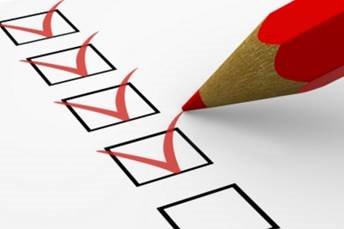
SPEAKING
Exercise 1. Find equivalents to these proverbs and learn them.
|
1 |
Never put off till tomorrow what you can do today. |
a |
Ніколи не відкладай на завтра те, що можеш зробити сьогодні. |
|
2 |
Rome was not built in a day. |
b |
Не відразу діло робиться. |
|
3 |
Saying and doing are two things. |
c |
Легше сказати, ніж зробити. |
|
4 |
Doing is better than saying. |
d |
Менше слів більше діла. |
|
5 |
No living man all things can. |
e |
Неможливо бути майстром на всі руки. |
WATCHING & LISTENING
![]() Exercise 2. Watch the video. Read and memorize the following words and expressions.
Exercise 2. Watch the video. Read and memorize the following words and expressions.
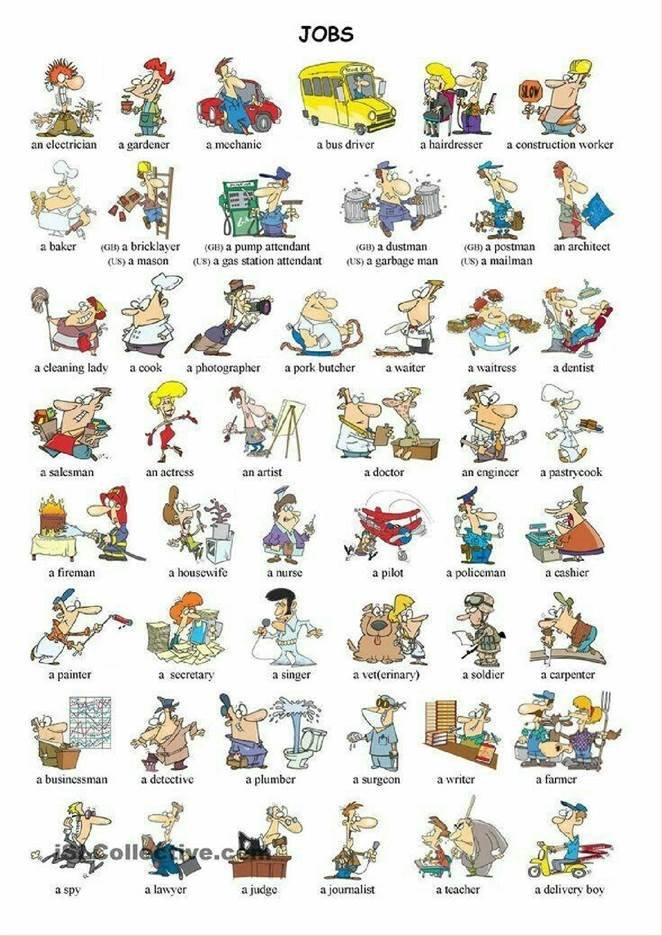
![]()
Exercise 3. Match each profession with its function.
|
1. a teacher 2. a doctor 3. a policeman 4. a clown 5. a postman 6. a dancer 7. a fireman 8. a baker 9. a dentist 10 a pupil |
a) He bakes bread. b) He works in a circus. c) He takes care of our teeth. d) He fights fires. e) She studies at school. f) He delivers letters. g) She gives pupils homework. h) He helps sick people. i) He protects people. j) She works in a theatre. |
Exercise 4. What do these people do?
1. A farmer -
2. A vet - 3. A teacher - 4. A photographer -
5. An astronaut -
6. A nurse -
7. A pilot -
8. A plumber - 9. A hairdresser -
10. A carpenter –
Exercise 5. What do they do? Put the sentences from the list into the correct columns below.
|
She wears a uniform. |
She works with children. |
|
He gets up very early. |
He answers the phone. |
|
He lives in the country. |
She corrects homework. |
|
She goes to foreign countries. |
She serves people with food and drinks. |
|
He likes animals. |
He gives people room keys. |
|
He meets a lot of people. |
She speaks three languages. |
|
She looks after passengers. |
She works in a school. |
|
He uses a word processor. |
She travels a lot. |
|
She works at home, too. |
He works outside. |
|
He has two students. |
She stays in a hotels a lot. |
|
She is an air hostess. |
He’s a receptionist. |
She’s a teacher. |
He’s a farmer. |
|
1. |
1. |
1. |
1. |
|
2. |
2. |
2. |
2. |
|
3. |
3. |
3. |
3. |
|
4. |
4. |
4. |
4. |
![]() Exercise 6. Test.
Exercise 6. Test.
1. A person who flies an airplane.
a) a pilot
b) an astronaut
c) a stewardess
2. A person who finds and
corrects mistakes in others' writings.
a) an editor
b) a receptionist
c) an estate agent
3. A person who gathers
and delivers news.
a) a lawyer
b) a designer
c) a journalist
4. A person who is hired to carry luggage.
a) a secretary
b) a porter
c) a reporter
5. A person who greets visitors at an office.
a) a receptionist
b) an accountant
c) a carpenter
6. A doctor who specializes in treatment of diseases by performing operations on the body.
a) a vet
b) a dentist
c) a surgeon
7. A person who arranges travel plans for clients.
a) a travel agent
b) a receptionist
c) an estate agent
8. A person who designs buildings.
a) an accountant
b) a designer
c) an architect
9. A person who takes care of patients.
a) a surgeon
b) a physicist
c) a nurse
10. A person who prepares food.
a) a lawyer
b) a chef
c) a carpenter
11. A person who writes software programs that are used on computers.
a) a machine operator
b) a computer operator
c) an editor
12. A person who cuts and styles hair.
a) a hairdresser
b) a haircutter
c) a hair styler
GRAMMAR
![]() Exercise 7. Perform arithmetic operations and name the Numerals.
Exercise 7. Perform arithmetic operations and name the Numerals.
Example:
2 + 1 = 3 two plus one is three.
5 – 4 = 1 five minus four equals one. 20 х 2 = 40 twenty multiplied by two is forty.
30: 6 = 5 thirty divided by six equals five.
|
22 + 45 = |
648 – 23 = |
2 x 40 = |
1000 : 10 = |
|
12 + 96 = |
29 – 2 = |
3 x 10 = |
100 : 2 = |
|
34 + 73 = |
39 – 34 = |
50 x 3 = |
500 : 5 = |
|
137 + 459 = |
935 – 395 = |
9 x 8 = |
20 000 : 200 = |
|
496 + 147 = |
95 – 50 = |
7 x 11 = |
777 : 1 = |
|
200 + 350 = |
839 – 300 = |
25 x 4 = |
225 : 25 = |
|
78 + 93 = |
700 – 100 = |
300 x 100 = |
6 000 : 6 = |
Exercise 8. Write the numbers.
1. The number of Gnomes with whom Snow White lived –
2. The Celsius freezing point –
3. Days in April –
4. The number of letters in the English alphabet –
5. An unlucky number –
6. Teeth in the normal human mouth –
7. The number of years in a millennium –
8. The number of months in a year –
9. Days in December –
10.Books in a trilogy – 11. Minutes in an hour – 12. Legs has an octopus – 13. Players in a soccer team – 14. Number of hours in a day –
15. Celsius boiling point –
![]()
Exercise 9. Write the correct ordinal number.
1. Saturday is the ![]() day of the week.
day of the week.
2. The month of the year is June.
3. The month of the year is March.
4. In a competition the gold medal is for the ![]() place and the silver medal is for the place.
place and the silver medal is for the place.
5. In Ukraine the ![]() day of the week is Monday, but in Britain, Monday is the day of the week.
day of the week is Monday, but in Britain, Monday is the day of the week.
6. Wednesday is the day of the week.
7. December is the ![]() month of the year.
month of the year.
![]() Exercise 10. Choose the correct
Exercise 10. Choose the correct
1. It happened in the middle of the twenty / twentieth century.
2. I usually go to school by bus six / bus sixth.
3. He is now ranked hundred / hundredth in the world of tennis. 4. The car changed the life of people in the 20th / the 20s
SPEAKING
![]()
Exercise 11. Tell the time.
|
3.00 |
7.00 |
4.15 |
7.45 |
11.20 |
|
15.00 |
19.00 |
16.15 |
19.45 |
23.20 |
|
5.00 |
9.00 |
6.30 |
8.10 |
12.40 |
|
17.00 |
21.00 |
18.30 |
20.10 |
2.40 |
WRITING
Exercise 12. Write a letter to your friend about your plans for the future using useful phrases.
|
1 |
I’d like to be … I am hoping to become… |
Я б хотів бути … Я сподіваюся стати… |
|
2 |
I think I could do a good job as… |
Думаю, міг би бути хорошим фахівцем як … |
|
3 |
My dream job is … |
Робота моєї мрії – це … |
|
4 |
As a child, I dreamed to become a… |
Коли був дитиною, то мріяв стати ... |
|
5 |
My parents wanted me to become a… |
Мої батьки хотіли, щоб я став … |
|
6 |
I’ve already chosen my future profession. |
Я вже обрав свою майбутню професію. |
|
7 |
I want to work hard / all days long. |
Я хочу працювати наполегливо / цілими днями. |
|
8 |
This job is very important. |
Ця робота дуже важлива. |
|
9 |
I dreamed about this job from school. |
Я мріяв про цю роботу із школи. |
|
10 |
I want to be a … , as my father. |
Хочу бути … , як тато. |
|
11 |
I’d like to work in a big office. |
Хочу працювати у великому офісі. |
|
12 |
A well-paid job is my dream. |
Добре оплачувана робота – моя мрія. |
|
13 |
I want to work in a company. ü in a bank. ü in a hospital. |
Хочу працювати у компанії у банку у лікарні |
|
14 |
Portfolio |
Портфоліо |
|
15 |
I am responsible / reliable/punctual / conscientious / polite. |
Я відповідальний / надійний / пунктуальний / сумлінний / ввічливий. |
LESSON 6
LEARNING FOREIGN LANGUAGE
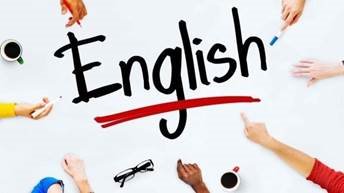
SPEAKING
Exercise 1. Read and memorize next words and word-combinations.
|
1 |
English learner |
[ˈɪŋglɪʃ ˈlɜːnə ] |
той, хто вивчає англійську |
|
2 |
English teacher |
[ˈɪŋglɪʃ ˈtiːʧə] |
вчитель англійської |
|
3 |
English-Ukrainian dictionary |
[ˈɪŋglɪʃ- ju(ː)ˈkreɪnjən ˈdɪkʃ(ə)n(ə)ri] |
англійсько-український словник |
|
4 |
vocabulary |
[vəʊˈkæbjʊləri] |
словарний запас |
|
5 |
native speaker |
[ˈneɪtɪv ˈspiːkə] |
носій мови |
|
6 |
foreigner |
[ˈfɒrɪnə] |
іноземець |
|
7 |
spoken English |
[ˈspəʊkən ˈɪŋglɪʃ] |
розмовна англійська |
|
8 |
speak English |
[spiːk ˈɪŋglɪʃ] |
розмовляти англійською |
|
9 |
talk in English |
[tɔːk ɪn ˈɪŋglɪʃ] |
говорити англійською |
|
10 |
write in English |
[raɪt ɪn ˈɪŋglɪʃ] |
писати англійською |
|
11 |
read in English |
читати англійською |
|
|
12 |
make progress in English |
[meɪk ˈprəʊgrəs ɪn ˈɪŋglɪʃ] |
робити успіхи у вивченні англійської |
|
13 |
improve knowledge of English |
[ɪmˈpruːv ˈnɒlɪʤ ɒv ˈɪŋglɪʃ] |
покращувати знання з англійської |
|
14 |
revise grammar rules |
[rɪˈvaɪz ˈgræmə ruːlz] |
повторювати правила з граматики |
|
15 |
practice English a lot |
[ˈpræktɪs ˈɪŋglɪʃ ə lɒt] |
багато практикувати |
|
16 |
have extra lessons in English |
[hæv ˈɛkstrə ˈlɛsnz ɪn ˈɪŋglɪʃ] |
брати додаткові уроки з англійської |
|
17 |
attend English courses |
[əˈtɛnd ˈɪŋglɪʃ ˈkɔːsɪz] |
відвідувати курси з англійської |
|
19 |
speak fluently |
[spiːk ˈflu(ː)əntli] |
говорити вільно |
|
20 |
speak confidently |
[spiːk ˈkɒnfɪdəntli] |
говорити впевненно |
Exercise 2. Read and memorize the following expressions.
|
1 |
knowledge of a foreign language |
знання іноземної мови |
|
2 |
a sign of good education |
ознака хорошої освіти |
|
3 |
I have been studying a foreign language for … |
Я вивчаю іноземну мову протягом … |
|
4 |
to give you a lot of opportunities |
давати багато можливостей |
|
5 |
to be not very good at grammar |
не дуже добре знати граматику |
|
6 |
to get a well-paid job |
отримати високо оплачувану роботу |
|
7 |
to make it a habit to study |
мати звичку навчатися |
|
8 |
to help you while travelling |
допомагати під час подорожі |
|
9 |
to broaden your mind |
розширювати світогляд |
|
10 |
ability to speak |
спроможність розмовляти |
Exercise 3. Fill in the necessary words. Read and memorize the following sentences.
1. Knowledge of foreign languages is very … nowadays.
2. First of all, it … a sign of good education.
3. I have been studying English for … years.
4. Knowing English gives you a lot of opportunities, for example…
5. I … that without English I won’t be able to get a well-paid job.
6. The most … thing is to make it a habit to study regularly.
7. The ability to speak a … language can help you in communication.
8. Knowing a foreign language is sure to broaden your mind as …
9. Knowing … languages will help you while travelling and the more so because people will be much friendlier if you address them in their own language.
10. To be honest, I am not very good at … .
Exercise 4. Answer the questions.
1. Why is it important to learn foreign languages?
2. How does knowledge of languages help businessmen, scientists, people of art?
3. Why do you learn English?
4. Is English an easy language to learn?
5. Would you like to learn one more language? Why?
WATCHING & LISTENING
![]()
Exercise 5. Listen to five people talking about their studies.
For questions 1 to 6, match the person to their experience. There is one extra option that does not match any of the speakers.
|
1 |
Mark is doing... |
A |
degree from home. |
|
2 |
Melissa is doing... |
B |
an evening class. |
|
3 |
Monica is doing... |
C |
a part-time university degree. |
|
4 |
Mitch is doing... |
D |
a course in business. |
|
5 |
Phillip is doing... |
E |
a postgraduate degree. |
|
6 |
None of the speakers are doing... |
F |
a university preparation course. |
READING
Exercise 6. Read and dramatize the following dialogue.
|
Vocabulary attending (verb): going to – I’m thinking about attending a language school in England next fall. content-based classes (noun): classes that focus on a particular subject – This program is well-known for its emphasis in content-based classes such as engineering. literacy (noun): the ability to read and write – Literacy is one key to educating the public. deadlines (noun): dates by which something must be done or completed – What is the deadline for submitting my application? apply (verb): to turn in or submit an application – I’ve decided to apply for an academic scholarship. issue (verb): to prepare and distribute – The police officer issued the driver a warning for speeding in a school zone. |
Receptionist: English Language Center. How can I help you?
Caller: Yes. I’m calling to find out more information about your program. For example, what kind of courses do you offer?
Receptionist: Well, first of all, the purpose of our program is to provide language learning opportunities to this area’s community [Uh-hum], whether a student’s goal is to master basic functional language skills, let’s say, for his or her job, or to study intensively to enter a US college or university.
Caller: Okay. I’m calling for a friend who is interested in attending a US university.
Receptionist: And that’s the kind of, uh, instruction that we provide, from basic communication courses to content-based classes such as computer literacy, intercultural communication, and business English.
Caller: Great. What are your application deadlines for the next semester?
Receptionist: Well, we ask applicants to apply no later than two months before the semester begins. [Uh-hum] This gives us time to process the application and issue the student’s I-20.
Caller: An I-20?
Receptionist: Oh, an I-20 is a form that indicates that we are giving permission for the student to study in our program, and then the student takes this form to the US embassy in his or her country to apply for the F-1 student visa.
Caller: All right. What is the tuition for a full-time student?
Receptionist: It’s two thousand thirty dollars.
Caller: And how does one apply?
Receptionist: Well, we can send you an application and you can mail it back to us, or you can fill out our application that’s online at our Web site.
Caller: And are there other materials I would need to send in addition to the application form?
Receptionist: Uh, yes. You would need to send in a $35 non-refundable application fee [Uh-huh], a sponsorship form indicating who will be responsible financially for the student while studying in our program, and a bank statement showing that you or your sponsor has sufficient funds to cover tuition expenses and living costs for the entire year of study.
Caller: And how can I send these materials to you?
Receptionist: You can either send the application packet by regular mail or you can fax it.
Caller: And the application fee?
Receptionist: We accept money orders, travelers checks, or credit cards.
Caller: All right. I think that’s about it.
Receptionist: Okay great.
Caller: Oh and what is your name?
Receptionist: Ok. My name is Tony Nelson. You can just call and ask for me.
Caller: Great. Thank you for your help.
Receptionist: No problem and please don’t hesitate to call again if you have any other questions.
Caller: Okay. Goodbye.
GRAMMAR
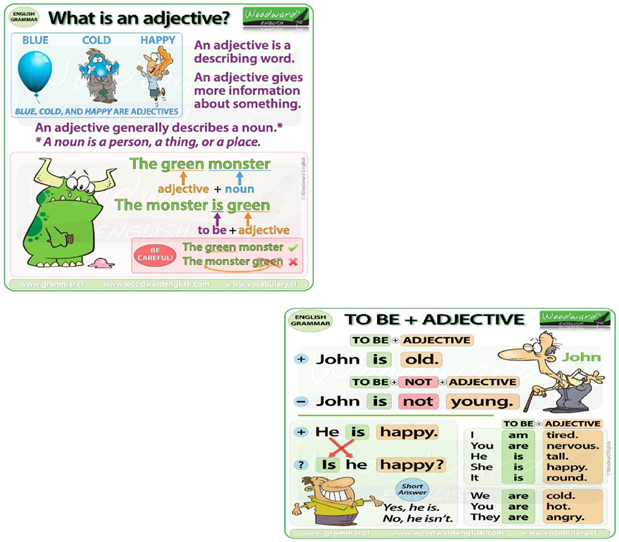
|
bad – big – difficult – expensive – far – fat – happy – hot – old – short |
![]() Exercise 7. Write the opposite of these Adjectives. Use the comparative form of Adjectives in the box below.
Exercise 7. Write the opposite of these Adjectives. Use the comparative form of Adjectives in the box below.
1. younger ⇒
2. colder ⇒
3. better ⇒
4. thinner ⇒
5. cheaper ⇒
6. nearer ⇒
7. sadder ⇒
8. smaller ⇒
9. easier ⇒
10. taller ⇒
Exercise 8. Choose the correct comparative Adjectives to complete these sentences.
1. My brother is older than .
a) me
b) I
c) my
2. We are better .
![]()
a) than them
b) than they
c) that them
3. Travelling by bus is travelling by car.
![]()
a) comfortabler than
b) more comfortable that
c) more comfortable than
4. The last test was more difficult than this test. This test is .
a) less difficult
b) dificultless
c) less difficult than
5. This exam was ![]() the last one.
the last one.
a) more easy than.
b) asier than
c) more easier than
6. Robert is than his opponent.
a) very stronger
b) much strong
c) much stronger
7. Kevin is funny, but George is .
![]()
a) more funny
b) funnier
c) funnier than
8. Your house is far, but my house is .
![]()
a) more far
b) farer
c) further
9. Kate is than her sister.
a) more friendly
b) friendlier
c) more friendlier
10.Everybody hates him. He really thinks that women are ![]() men.
men.
a) intelligentless than
b) less intelligent that
c) less intelligent than
Exercise 9. Write comparative Adjectives using the Adjectives in brackets.
1. I like the black sofa, but I think the brown sofa is (comfortable).
2. This bar is (noisy) than the bars in my street.
3. Marseille is much (hot) than Paris.
4. The helicopter was loud, but the ambulance was (loud).
5. Do you think Manchester United is (good) Manchester City this year?
6. The novel is much (interesting) than the film.
7. Canadians are (rich) thanin the past.
8. This summer was (wet) than last summer.
9. I liked the old version of the game, but the new version is much (exciting).
10. Sorry, 8 o'clock is very late. Can we meet a bit (early)?
Exercise 10. Write the superlative forms of these Adjectives.
EXAMPLE: poor ⇒ the poorest
1. young ⇒
2. sad ⇒
3. remote ⇒
4. smelly ⇒
5. bad ⇒
6. amazing ⇒
7. pretty ⇒
8. flat ⇒
9. short ⇒
10. exciting ⇒
Exercise 11. Choose the correct superlative or comparative forms to complete these sentences.
1. Which is planet from the Sun?
a) the farest
b) the most far
c) the farthest
2. the world lives in Indonesia.
a) The oldest man of
b) The oldest man in
c) The most old man of
3. My two sons are good football players, but Jason is . a) best
b) the best
c) better
4. It was day of my life.
a) the most happy
b) the most happiest
c) the happiest
5. What is phone on the market?
a) the thinnest
b) thinnest
c) the most thin
6. Last summer was ![]() season in recorded history.
season in recorded history.
a) the dryest
b) the most dry
c) the driest
7. I'm 10 years ![]() than my wife.
than my wife.
a) oldest
b) the oldest
c) older
8. He is ![]() person in my life.
person in my life.
a) the most important
b) the more important
c) the importantest
9. Our graduates earn salaries in every US state.
a) the higher
b) the highest
c) the most high
10. That was moment of my life.
a) the sadest
b) the saddest
c) the most sad
Exercise 12. Write superlative Adjectives using the Adjectives in brackets. Include the.
EXAMPLE: She is the most intelligent (intelligent) student in my class.
1. July is (dry) month in southern Spain. It hardly ever rains.
2. One World Trade Center is (tall) building in New York.
3. She is (healthy) person I know.
4. Egypt is one of (ancient) civilizations.
5. He was (fast) runner in 2017.
6. What month is (hot) in Scotland?
7. She described her year in Singapore as (amazing) experience of her life.
8. What is (bad) neighbourhood in London?
9. It was (slow) car on the circuit.
10.We sell (red) and most perfect apples.
Exercise 13. Read the opinion about “Learning English”. Answer the questions.
Tim says: I studied English at school and I can say that it is a difficult language to learn. Sometimes it was hard for me to understand some grammar points, sometimes I was bad at pronouncing English words as you know the English sounds are different from the Ukrainian ones. But the knowledge of English is a must for any man who thinks he is well-educated. English is necessary if you want to use the Internet because 90 % materials are in English. It is the international language of science, business and tourism. If you know English, you can communicate with millions of people who speak different languages That’s why I think that studying a foreign language is very important. And some activities — singing, talking, reading — are fun!
1. Why is it necessary to know English according to Tim?
2. Is your English good enough?
3. Is it easy to learn English at college?
4. What do you enjoy doing in English most of all?
5. Which things do you find most difficult or dislike doing?
6. Why do you learn English?
7. Have you ever been to an English-speaking country?
8. Is your English good enough to travel as a tourist?
LISTENING & SPEAKING
Exercise 14. Listen to the recording and use the missing words. Learn by heart.
![]()
Many teachers and say English can be to learn. It has more than any other language. The biggest contain about six hundred thousand words. Many people who come to the United States from ![]() countries have already studied English. They may have done very
countries have already studied English. They may have done very
. But when they arrive here, they may not
![]() much of what they or . English learned in classrooms sometimes seems very different from everyday English. Studies that it can take several years of living in the United States while studying English for a foreign person the language well.
much of what they or . English learned in classrooms sometimes seems very different from everyday English. Studies that it can take several years of living in the United States while studying English for a foreign person the language well.
LESSON 7
TIPS FOR LEARNING ENGLISH
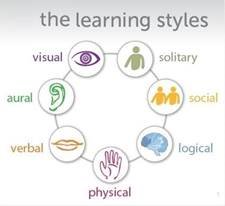
SPEAKING
Exercise 1. Review the poster and discuss each way to learn English.
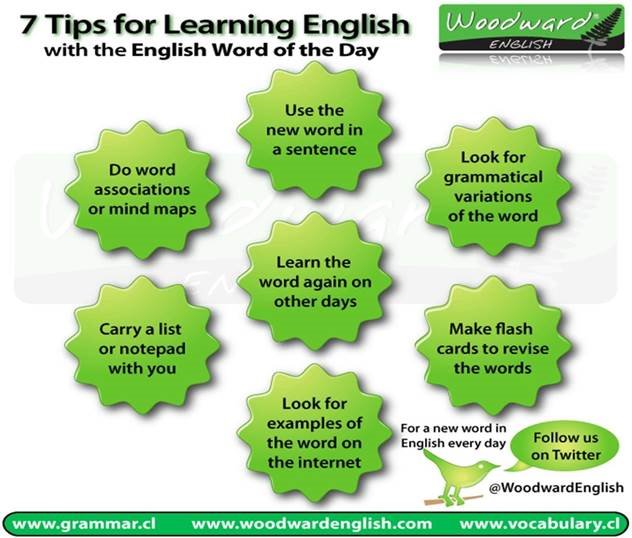
READING
Exercise 2. Read the text, choose titles for its parts.
How to learn English quickly: 10 tips
A_ Read everything you can get your hands on
B_ Actively take note of new vocabulary
C_ Talk with real live humans
D_ Subscribe to podcasts or YouTube channels (in English)
E_ Go abroad
F_ Use your friends
G_ Ask a lot of questions
H_ Take a lead from the stars
I_ Start with what you really need
J_ Don’t kick yourself while you’re down
1. Classic literature, paperbacks, newspapers, websites, emails, your social media feed, cereal boxes: if it’s in English, read it. Why? Well, this content will be full of juicy new vocabulary, as well as a fair amount you already know. This helps you improve quickly, as re-exposure to learn vocabulary gives you new examples in context, therefore reinforcing those words in your mind. On the other hand, learning new words and expressions is essential to building your vocabulary arsenal, particularly in a language like English with so many words! However, don’t just read and move on – next, you’ve got to…
2. This tip is a classic one for good reason: it works! When learning, we often enjoy a new word of phrase so much that forgetting it seems impossible. But trust us, not everything sticks the first time. To fight this, get into the habit of carrying around a funky notebook or using a tool like Evernote. Whenever you hear or read a new word or expression, write it down in context: that is, in a sentence and with its meaning noted.
This saves you time as you won’t return to that word and ask yourself: “What did that word/expression mean again?”
3. What is a language for if not to communicate? Sure, we humans have become experts at communicating without opening our mouths – thanks WhatsApp! – but when push comes to shove, it’s true that speaking a language helps it stick in your head far better than only reading or writing it. Just think of how many times you’ve heard people say that they “understand, but can’t speak English.” A lot of would be English speakers have turned talking into a huge insurmountable barrier that only serves to psyche them out. Don’t be like that. Seek out native speakers for an informal language exchange, enroll in a course, or take classes online.
4. Like humor? Politics? Blogging? Cooking? With topics covering every interest imaginable, there’s an English-speaking podcast or YouTube channel out there for you. Subscribe to a few and listen while driving or watch during the commute to school or work. At first, you might find the native accents difficult, but stick with it and you’ll soon start to understand what you hear (as well as learning lots of new vocab from a native speaker!)
5. If there’s a better way to learn English than being immersed in it while living and studying in an English-speaking country, we’d love to know! It’s no secret that English is the most widely-spoken language in the world, and with a long list of countries to choose between, you can select your ideal learning environment based on hemisphere, weather, or favorite city. Think Australia, New Zealand, the UK, the US, Canada, and South Africa to name a few!
6. Have friends who post online in English? Don’t gloss over them in your newsfeed: scan the items they share and commit to exploring one or two each day. They might be news or magazine articles, videos, talks, blog posts, songs, or anything else: if it’s in English and the topic interests you, it’s going to be helpful!
7. Curiosity may have killed the cat, but it also propelled the language learner to fluency! As you learn English, you’ll soon collect a mountain of questions. Don’t sit on your doubts – be curious and resolve them! If you’re enrolled in a course, ask your teacher (it’s what they’re there for, after all). But if you’re learning alone, don’t worry: find answers in blogs or language websites, ask other learners, or read through forums.
You’ll be happy you did!
8. Mix up your learning by picking a native English-speaking actor or singer you like.
Now, head online, find a bunch of interviews they’ve given – and watch them! Watch once for gist, then again, taking time to note down interesting expressions and words you hear. The slang, stories, humor, and anecdotes that come out of these interview are sure to give you plenty to work with!
9. Your English studies are likely to go far more quickly if you constantly remind yourself of your motives for learning. Are you going on a study exchange? Then, focus on vocabulary related to your studies. Have an overseas conference? Brush up on conversation starters to use with the other participants. Going on a gap year? Looks like travel and tourism vocabulary will be your guide. If you simply launch into learning English hoping to magically learn anything and everything at once, you’re likely to end up confused and burned out. Which brings us to…
10. When you start to feel like you’re not making ground – which happens to all learners at some point – don’t say, “I don’t speak English,” or “I’ll never get this.” In fact, ban those phrases from your vocabulary! They only blur your understanding of the progress you’re making and convince you that your dreams of speaking English well are impossible. Instead, say “I’m learning English and making improvements everyday,” “It’s not always easy, but it’s worth it,” “I’m so much better that I was six months ago,” and other phrases to remind yourself of the big picture.
![]() LISTENING & SPEAKING
LISTENING & SPEAKING
Exercise 3. Watch the video, choose the main tips of learning English. Discuss them.
GRAMMAR
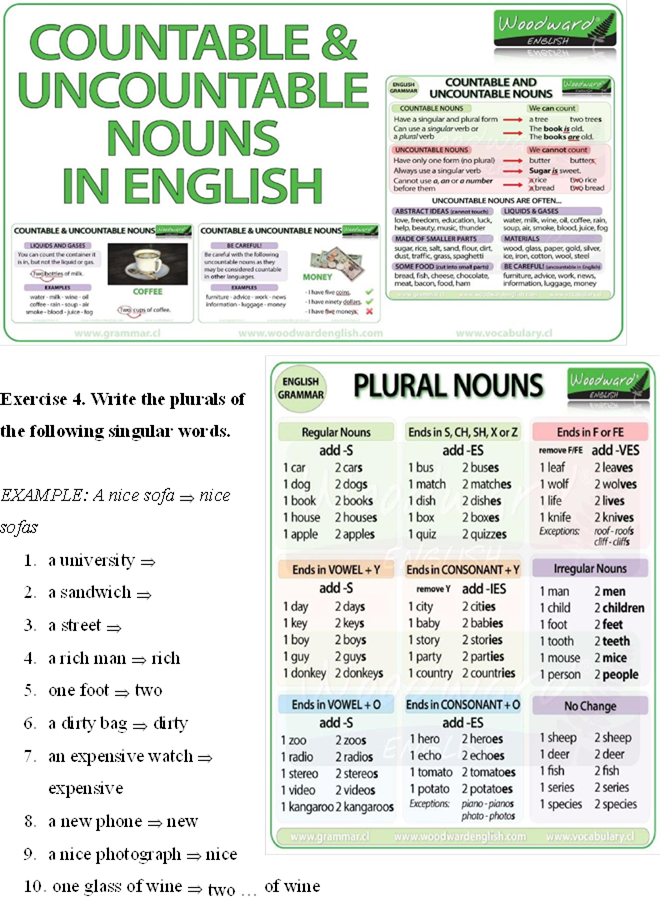
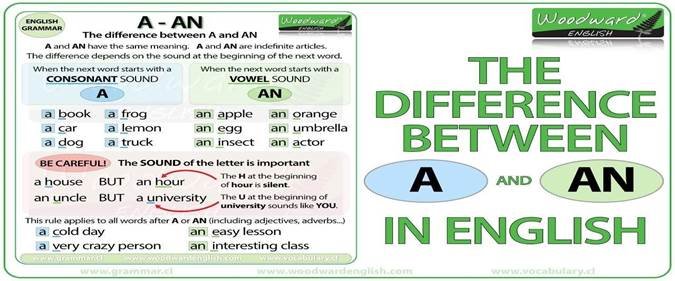
Exercise 5. Choose a/an for the following words.
1. It's … animal.
2. I need … new bed.
3. It's … useful machine.
4. I'm … waiter.
5. Do you have … umbrella?
6. I'm … English teacher.
7. I need … hat.
8. Is she … student?
9. We have … ugly duck.
10. I need … hour.
Exercise 6. Write a/an before the singular words and write the plural forms.
EXAMPLE: An olive ⇒ olives
1. … bus ⇒
2. … nice family ⇒ nice
3. … Italian child ⇒ Italian
4. … strong tooth ⇒ strong
5. … nice dress ⇒ nice
6. … angry wife ⇒ angry
7. … uniform ⇒
8. … amazing website ⇒ amazing
9. … elephant ⇒
10. … empty library ⇒ empty
![]() Exercise 7. Choose a/an, the or no article to complete the following sentences.
Exercise 7. Choose a/an, the or no article to complete the following sentences.
1. We bought some cheese and ham. … cheese was delicious.
2. It's … interesting book. 3.There was … document on the table.
4. Experts say that … coffee can be good for your health.
5. I don't have … car.
6. Can you pass me … water?
7. … president visited our school.
8. My father is … police officer.
9. Everybody knows that … cats are very independent animals.
10. She picked me up at … airport.
Exercise 8. Choose a/an, the or no article to complete the sentences below.
1. Where is Jennifer? She's in kitchen.
a) a
b) the
c) –
2. Do you want to have lunch with me?
a) a
b) the
c) –
3. What are you going to do next Saturday?
a) a
b) the
c) –
4. I want to learn how to play piano.
a) A
b) the
c) –
5. We want to buy ![]() new car.
new car.
a) a
b) the
c) –
6. My favourite subject is history.
a) a
b) the
c) –
7. students in my class are great.
a) a
b) the
c) –
8. Medicine will be completely different in 2050.
a) the
b) a
c) –
9. He is very interested in computers.
a) A
b) the
c) –
10. A thief got into our office and stole computers. a) a
b) the
c) –
Exercise 9. Complete the following sentences with a/an, the or no article.
1. We went to … nice restaurant yesterday.
2. Can you bring me some ham from … fridge?
3. You never eat … fish.
4. She cooked a very nice meal yesterday. … fish was delicious.
5. Nowadays, … children spend a lot of time using technology.
6. I'm going to buy … new computer because … computer in my office is broken.
7. I don't like … police officers, but … police officers in this town are nice.
8. Laura has … dog and some cats. … dog is really cute.
9. My father is … pianist. He is … great musician.
10. I don't like … chicken, but I like … chicken that my mother cooks.
ANNEX TEST 1
PLURAL OF NOUNS
Choose the correct variant.
1. Our two … are crying all the time.
a) babies
b) babys
c) babyes
2. No news … good news.
a) is
b) are
c) am
3. … usually fly not very high.
a) Flyes
b) Flys
c) Flies
4. These potatoes weigh five … .
a) kiloes
b) kilos
5. I don’t like going by car. If I have a chance, I always go on … .
a) foot
b) feet
c) foots
6. What do you need these … for?
a) boxs
b) boxes
7. Those were the happiest days of our … .
a) lifes
b) lives
c) life
8. Leaves usually … trees in autumn.
a) leaf
b) leave
c) leafs
d) leaves
9. Big … don’t cry.
a) boys
b) boyes
c) boy
10. I prefer natural … when I want to change my hair style.
a) dies
b) dyes
c) dys
11. It is rather dangerous to walk on … after the rain.
a) roofs
b) roof
c) rooves
12. Dentists recommend using whitening paste for … .
a) tooth`s
b) tooth
c) teeth`s
d) teeth
13. … are flowers of life.
a) Childs
b) Children
c) Childrens
14. The naughty kid likes throwing rotten … at passers-by.
a) tomatos
b) tomatoes
c) tomato
15. 50 … of oil leaked out of the tanker into the sea.
a) tones
b) tons
c) tonns
16. … in our house are so annoying. We definitely need a cat.
a) Mouses
b) Mices
c) Mice
d) Mousees
17. My little son is afraid of grey … that come at night.
a) wolfys
b) wolvies
c) wolves
d) wolvys
TEST 2
PRONOUN
Choose the correct variant.
1. my friends over there.
a) This are
b) These is
c) Those are
d) That are
2. oxen ![]() not dangerous.
not dangerous.
a) This ... is
b) These ... are
c) That ... is
3. pair of jeans from the USA.
a) These ... are
b) This ... is
c) Those ... are
4. What in the bag? – Just books.
a) are these
b) is that
c) are those
5. hard to find a good friend.
a) This is
b) That is
c) It is
6. geese like hissing.
a) This
b) These
c) That
7. The climate here is like of Spain.
a) that
b) this
c) those
8. Now , let’s talk over our future plans.
a) then
b) that
c) it
9. was I who broke the window.
a) These
b) Those
c) It
10. To be or not to be ![]() is the question.
is the question.
a) that
b) this
c) these
11. I didn’t know that your new car is expensive.
a) this
b) these
c) that
d) those
12. is cold and I am tired.
a) This
b) That
c) It
13. lice of yours so disgusting.
a) This ... is
b) That ... is
c) These ... are
14. news ![]() rather frustrating.
rather frustrating.
a) This ... is
b) That ... is
c) These ... are
15. Life is great - ![]() is spring and I am in love.
is spring and I am in love.
a) this
b) it
c) that
16. time you made a wrong decision.
![]()
a) that
b) this
c) it
17. I hate to explain one thing a thousand times.
![]()
a) this
b) it
c) that
18. deer are so graceful.
![]()
a) That
b) This
c) These
19. Do you see ![]() house in the distance? – It is my grandma’s place. a)this
house in the distance? – It is my grandma’s place. a)this
b) that
c) these
20. What is your attitude to phenomena, shown in that TV program? a) this
b) those
c) that
TEST 3
PRONOUN Choose the correct variant.
1. What colour is the car? – It is quite far, I can’t see colour. a) it
b) it’s
c) its
2. There were last words.
a) his
b) him
c) he
3. told me a funny story the other day.
a) A mine friend
b) Of my friend
c) A friend of mine
4. Why are you sitting here? It is not your place, but .
a) her
b) she
c) hers
5. These sweets are very tasty. Could you give ![]() to me, please? a) it
to me, please? a) it
b) them
c) they
6. Where is the cooler? – You are standing next to . a) it
b) him
c) he
7. You haven’t seen ![]() ! How can you say, that she is a bad painter? a) hers picture
! How can you say, that she is a bad painter? a) hers picture
b) her picture
c) a picture of hers
8. In what direction do you usually hitch-hike? – Western Europe. Join a) our
b) we
c) us
9. On holiday I’m going to stay in house.
a) they
b) their
c) them
10. I really love ![]() here in Paris!
here in Paris!
a) his
b) it
c) them
11. It is a very good project, but is better.
a) ours
b) our
c) us
12. Jack: Are you listening to ?
a) I
b) me
c) my
13. Every cat washes face after eating.
a) his
b) her
c) its
14. Hmmm! Nice photos! – Yeah! It’s in Hawaii.
a) our
b) we
c) us
15. What are you doing? – It is none business!
a) your
b) of your
c) of yours
16. Our children will go to the concert. So will ?
a) their
b) they
c) theirs
17. Look at my new watch. Do you like ?
a) it
b) them
c) they
18. This is his “Jaguar”, and this “Harley Davidson” is also .
a) he
b) him
c) his
19. They seem to be good guys. What do you have against ?
a) they
b) their
c) them
|
20. Let’s send these flowers to a) she b) her c) he
|
. I’m sure, she will be pleased. |
TEST 4
ADJECTIVE Choose the correct variant.
1. My wife is … than your wife.
a) the most beautiful
b) beautifuller
c) more beautiful
2. Their flat is … than ours.
a) more large
b) larger
c) the larger
3. You are … person that I know.
a) luckyer
b) the luckiest
c) the luckyest
4. Cats are not so clever … dogs.
a) as
b) so
c) than
d) that
5. The situation is … than I thought.
a) more bad
b) badder
c) worse
6. Today the weather is … than yesterday.
a) niceer
b) more nicer
c) much nicer
7. For me mathematics is … physics.
a) more easy as
b) easyer than
c) easier than
8. This car is … of all.
a) an expensive
b) the least expensive
c) a less expensive
d) the little expensive
9. Concord was … plane in the world.
a) fast
b) fastest
c) the fastest
10. The new teacher is … than the previous one.
a) many good
b) a lot better
c) many better
d) a lot of good
11. This room is not so … as that one on the first floor.
a) the most comfortable
b) more comfortable
c) comfortable
12. The more you learn … you become.
a) smarter
b) the smarter
c) the smartest
13. These jeans are too small. I need … size.
a) a large
b) a larger
c) a largest
14. We left … way possible.
a) the quickiest
b) a quick
c) a quicker
d) the quickest
15. It is … to go for a walk, than to watch TV at home.
a) good
b) the best
c) better
16. What sea is … the Black or the Red?
a) less salty
b) little saltier
c) less saltier
17. The band will play on … stage.
a) a new
b) a newer
c) the newest
18. Oh! This dress is … expensive than I expected!
a) much
b) more
c) a lot
19. It will do you … if you start doing your homework.
a) good
b) better
c) the best
20. It is … dog that I have ever seen!
a) the bigest
b) biger
c) the biggest
СПИСОК ВИКОРИСТАНИХ ДЖЕРЕЛ

1. Україна. Закони. Про вищу освіту : Закон України від 1 липня 2014 р. № 1556 - VII / Україна. Закони // Офіційний вісник України. - 2014. - № 63. - С. 7 - 90.
2. Державний стандарт базової середньої освіти [Електронний ресурс]. - Режим доступу: https://www.kmu.gov.ua/npas/pro-deyaki-pitannya-derzhavnih-standartiv- povnoyi-zagalnoyi-serednoyi-osviti-i300920-898
3. Голіцинський Ю.Б. Граматика. Збірник вправ. Каро, 2017.
4. Нерсисян М.А., ПіроженкА.О. Англійська мова, 10 клас, рівень стандарту.
Перун, 2018.
5. English Test [Електронний ресурс]. - Режим доступу: https://test-english.com/
6. Easy English [Електронний ресурс]. - Режим доступу: https://www.youtube.com/watch?v=M4FMEmlOqTM&t=36s&ab_channel=EasyEnglish
7. English worksheets and online exercises [Електронний ресурс]. - Режим доступу: https://www.liveworksheets.com/worksheets/en
8. Lean-English[Електронний ресурс]. - Режим доступу: https://learn-english.net.ua/samovchitel/vpravi-kotra-godina-what-time-is-it
9. Перший Кембриджський освітній центр [Електронний ресурс]. - Режим доступу: https://cambridge.ua/uk/blog/kak-rasskazat-o-svoyom-hobbi-na-anglijskom/
10. Pinterest [Електронний ресурс]. - Режим доступу:
https://in.pinterest.com/pin/6614730693184381/
11. Woodward English [Електронний ресурс]. - Режим доступу: https://www.google.com/search?q=adjective+woodward&rlz
12. How to learn English faster [Електронний ресурс]. - Режим доступу:
https://www.ef.com/wwen/blog/language/how-to-learn-english-faster/


про публікацію авторської розробки
Додати розробку
